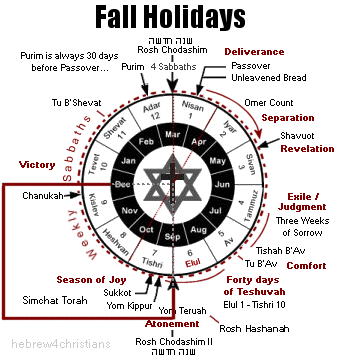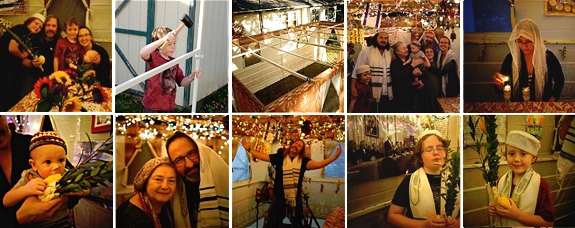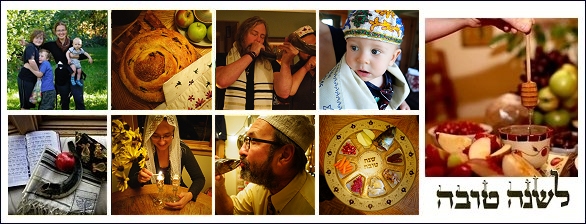|
Jewish Holiday Calendar
Note: For October 2016 site updates, please scroll past this entry....
The Jewish civil year begins in the fall, though the Biblical year begins in spring (Exod. 12:2). Preparations for the fall holidays begin with a thirty day period of teshuvah (repentance) during the (late summer) month of Elul. The following ten days begin with the Feast of Trumpets (i.e., Rosh Hashanah, on Tishri 1) and end with the Day of Atonement (i.e., Yom Kippur, on Tishri 10). These first ten days of the new year are called the "Ten Days of Awe" (i.e., aseret ye'mei teshuvah: עֲשֶׁרֶת יְמֵי תְּשׁוּבָה), or simply the Jewish "High Holidays." Just five days after the solemn time of Yom Kippur begins the joyous week-long festival of Sukkot ("Tabernacles"), which is immediately followed by the celebration of Simchat Torah. The holiday of Chanukah occurs in late fall and carries over to the winter season:
The Fall Holidays:

The fall festivals prophetically indicate the Day of the LORD, the second coming of Yeshua, the great national turning of the Jewish people, and the establishment of the reign of the Messiah upon the earth during the Millennial Kingdom in the world to come.
Note that in accordance with tradition, holiday dates begin at sundown. Moreover, some holidays may be postponed one day if they happen to fall on the weekly Sabbath:
- Month of Elul (Friday Sept. 2nd, 2016 [eve] - Sun. Oct. 2nd, 2016)
- Month of Tishri (Sun. Oct. 2nd [eve] - Tues. Nov. 1st [day])
- Month of Cheshvan (Mon. Oct. 31st [eve] - Wed. Nov. 30th [day])
- Four Sabbaths: Noach, Lekh-Lekha, Vayera, Chayei Sarah
- Yom Ha'Aliyah - A modern holiday that honors honor the contributions of olim (immigrants) to Israeli society (Cheshvan 7 - Thurs., Oct. 26)
- Sigd - 50th day after Yom Kippur; Ethiopian Jewish holiday (Tues., Nov. 29)
- Month of Kislev (Wed. Nov. 30th [eve] - Fri. Dec. 29th [day])
- Four Sabbaths: Toldot, Vayetzei, Vayishlach, Vayeshev
- Winter Solstice: Wed. Dec. 20th (Kislev 20)
- Dates for Chanukah 2016 (5777):
- 1st Chanukah candle - Sat. Dec. 24th [i.e., Kislev 25]
- 2nd Chanukah candle - Sun. Dec. 25th
- Christmas: Sun. Dec. 25th
- 3rd Chanukah candle: Mon. Dec. 26th
- 4th Chanukah candle: Tues. Dec. 27th
- 5th Chanukah candle: Wed. Dec. 28th
- Month of Tevet (Thurs., Dec. 29th [eve] - Fri. Jan. 27th [day])
- Four Sabbaths: Miketz, Vayigash, Vayechi, Shemot
- Dates for Chanukah (continued):
- 6th Chanukah candle: Thur. Dec. 29th (Rosh Chodesh Chanukah)
- 7th Chanukah candle: Fri. Dec. 30th
- 8th Chanukah candle: Sat. Dec. 31st [Zot Chanukah]
- Secular New Year: Sun. Jan. 1st, 2017 (Tevet 3)
- Tenth of Tevet - Sun. Jan. 8th, 2017; fast over the seige of Jerusalem
 |
Note: Some calendars will list the first day of a holiday without indicating that the holiday actually begins sundown the night before... So, for example, while Chanukah begins Saturday, Dec. 24th at sundown, many calendars may indicate that it occurs on Sunday, December 25th.
October 2016 Updates
Note: If any page content appears to be missing, please refresh the page...
The Primacy of Truth...
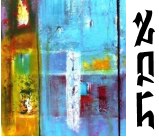
10.31.16 (Tishri 29, 5777) In Hebrew, the word for truth, i.e., emet (אֱמֶת), contains the first, middle, and the last letter of the Hebrew alphabet, indicating that truth encompasses all things and endures from the beginning (א) to the end (ת). The sages sometimes say "the seal of God is truth," since the final letters of the three words that conclude the account of creation, namely, bara Elohim la'asot ("God created to do" [Gen. 2:3]), spell the word emet. The word for falsehood, on the other hand, is sheker (שֶׁקֶר), composed of letters near the end of the alphabet, suggesting instability, impermanence, and distance from God. Indeed the letter Aleph represents the preeminent and ineffable glory of God, but if we remove Aleph from the word emet, we are left with the word "dead" (i.e., met: מֵת), the opposite of life (i.e., chayim: חַיִּים). Therefore, if we attempt to ignore or suppress God in our understanding of truth, we end up with death. And since Yeshua told us, "I am the way (הַדֶּרֶךְ), the truth (הָאֱמֶת), and the life (הַחַיִּים); no one comes to Father apart from me" (John 14:6), those who deny His reality are in a state of spiritual death.
אָנכִי הַדֶּרֶךְ וְהָאֱמֶת וְהַחַיִּים
וְאִישׁ לא־יָבא אֶל־הָאָב בִּלְתִּי עַל־יָדִי
a·no·khi · ha·de·rekh · ve·ha·e·met · ve·ha·chai·yim
ve'ish · lo · ya·vo · el · ha·av · bil·ti · al · ya·di

"I am the way, and the truth, and the life.
No one comes to the Father apart from my hand."
(John 14:6)
Hebrew Study Card
Of the thirteen attributes revealed to Moses that defined the Name י־ה־ו־ה (Exod. 34:6-7), two are joined together. The LORD is rav chesed ve-emet (רַב־חֶסֶד וֶאֱמֶת), abundant in lovingkindness and truth, indicating that his love is always the Center of Reality... In other words, just as God's Name means "Presence" and "Breath," it also means "Compassion," "Love," "Life," and "Faithfulness." As Yeshua testified: "I AM Aleph and Tav, the beginning and the ending," says the LORD God (יְהוָה אֱלהִים), "the One Who is, and Who was, and Who is to come (הַהוֶה וְהָיָה וְיָבוֹא), the LORD of Hosts" (Rev. 1:8).
It's been said that the ancient Greek mindset regarded what is beautiful as what is good, whereas the Hebraic mindset regarded what is good as what is beautiful. The difference is radical. Doing our duty before God, in other words, is what is truly beautiful, not merely appreciating the appearance of symmetry, order, balance, and so on. This explains why moral discipline (i.e., musar, מוּסָר) is so prominent in Hebrew wisdom literature. In the spiritual sense, beauty cannot exist apart from moral truth, and moral truth cannot exist apart from "doing the truth" through acts of righteousness...
Stages of Judgment...
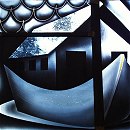
[ The following entry concerns this week's Torah reading, parashat Noach... ]
10.31.16 (Tishri 29, 5777) Some of the sages think that God's judgment comes in stages. The Great Flood was preceded by four successive generations of prophets that warned of the coming cataclysmic judgment: Enoch, Methuselah, Lamech, and finally Noah. It is fascinating to understand that Adam himself was alive when Noah's grandfather Methuselah was born, so the original message of teshuvah (repentance) was an echo that came from Eden itself; moreover, consider that Abraham personally knew of Noah (Abraham was 58 years old when Noah died), and undoubtedly Noah's son Shem told him of his grandfather Lamech, who had seen and spoken with Adam who was directly created by God alone. Later, Abraham's son Isaac also came to know Shem, Noah's firstborn son, and the legacy of the "gospel of the garden" was thereby passed on...
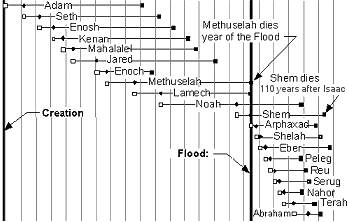 |
The first stage was the abandonment of the inherent dignity of others as people created in the image and likeness of God. This negation of the divine characteristics of people led to sexual promiscuity that became rampant upon the earth: "The sons of God saw the daughters of man that they were fair, and they took for themselves wives, whomsoever they chose" (one midrash claims that the Dor HaMabul, the generation of the flood, would regularly exchange marital partners). God then gave mankind 120 years to repent from his sexual corruption or be faced with apocalyptic destruction (Gen. 6:3). Despite Noah's 120 year public building project and the preaching of his grandfather Methuselah, God's patience finally ran out (1 Pet. 3:20). God then "saw that the wickedness of man was great in the earth and that every imagination of the thoughts of his heart was only evil continually" (Gen. 6:5). Mankind refused to repent and turn to God....
There is a tragic progression at work here. The practice of "casual" acts of lawlessness eventually led to the acceptance and practice of sexual promiscuity. This, in turn, resulted in the loss of mankind's sanctity (kedushah), since this comes from man's ability to subordinate his instinctual/emotional desires to his intellectual/spiritual life. Genuine sanctity refuses to exploit others as means to an end. Disregarding this truth cheapens and impairs the sense of self, causing disintegration of the spiritual life. As humanity became more and more fractured and stupefied, God's "like for like" judgment resulted in "giving them over" (paradidomi) to the lusts of their hearts (Rom. 1:26). (In our culture of unbridled pornographic expression and sexual immorality, we mirror such an antediluvian world view. Indeed, it is a mark of our age to be enamored with "degrading passions," with gender confusion and regularly practiced idolatry (i.e., fornication, adultery, homosexual relationships, and so on)). The final verdict of this practiced chamas (lawlessness) was the bestowal of a "depraved mind" (αδοκιμον νουν), a condition of being unable to reason properly at all. Since truth is essentially grounded in a sense of value, and value is a function of conscience, a depraved mind is literally insane from a spiritual perspective... People who are devoid of conscience are unable to reason along the lines of ethical truth at all. This promoted a cultural collusion to suppress the truth, to silence the truth-tellers, to kill the prophets, and to gag advocates for justice. Lawlessness squelches the inward voice of right and wrong within the human heart.
Note: For more on this topic, see "The Days of Noah."
As the Days of Noah...

10.31.16 (Tishri 29, 5777) "For as were the Days of Noah (ימֵי נחַ), so will be the coming of the Son of Man. For as in those days before the flood they were eating and drinking, marrying and giving in marriage, until the day when Noah entered the ark, and they were unaware until the flood came and swept them all away" (Matt. 24:38-9). Yeshua told us that the "Days of Noah" were marked by people who were asleep, blind, and unaware (ἔγνωσαν, "agnostic") of spiritual truth. They lived their days oblivious to Reality. They "forgot" who God was, who they were, why they existed, and where they were going. They engaged in deception, violence, theft, and rampant promiscuity. Such is our world today...
The deadening effects of sin leads to moral and spiritual blindness that leads to corruption and unthinking brutality and violence. Of Noah's generation it was written that "the whole earth was corrupt before God, and filled with violence" (Gen. 6:11). Rashi understood the word "corruption" (shachat) to primarily refer to sexual immorality (i.e., idolatry) and "violence" (chamas) to primarily refer to theft and robbery. In general, however, the sages regarded the word chamas to refer to lawlessness, that is the denial of Torah, and consequently the benighted condition of living without yirat ha-shamayim (awe of heaven). When people are spiritually dead, they are unconscious of the wonder of God; oblivious to what is real; and they are consequently debased into mere animals...
About Pagan Halloween...

10.31.16 (Tishri 29, 5777) About those who regard pagan holiday of "Halloween" seriously, remember that there is sorcery (i.e., nachash: נַחַשׁ) against Jacob, there is no divination (i.e., kesem: קֶסֶם) against Israel. At this time it must be said of Jacob and of Israel, 'Look at what God has done (מַה־פָּעַל אֵל)' [Num. 23:23]. No weapon formed against God's people shall prosper (Isa. 54:17), and the curse of the wicked is powerless against the tzaddikim (Prov. 26:2). Ein od milvado (אֵין עוֹד מִלְבַדּו) - God is the only true Power (Deut. 4:35; 1 Chron. 29:11; Rev. 4:11). Satan is an impostor and a foiled usurper. As Yeshua told his followers, "Behold I give to you authority to tread on serpents and scorpions and over all the power of the enemy, and nothing shall by any means hurt you" (Luke 10:19). Like Balaam and Haman, all those who curse God's people or attempt to foil His plans will be upended... Amen.
Parashat Noach (פרשת נח)

[ The following entry concerns this week's Torah reading, parashat Noach... ]
10.30.16 (Tishri 29, 5777) Last week's Torah portion (Bereshit) showed how the mutiny of Adam and Eve caused humanity to plunge into idolatrous chaos. The subsequent generations lost sight of the LORD and became progressively steeped in moral anarchy and bloodlust, so that "every intention of the thoughts of man's heart was only evil continually" (Gen. 6:5). After just nine generations, the LORD had grown so weary of humanity that he "regretted" (i.e., yinchem: יִּנָּחֶם) creating man and "his heart was grieved" (Gen. 6:6). However, God recognized Noach (from the godly line of Seth) as a tzaddik (צַדִּיק), a righteous man of faith, and graciously made provision to save him from the wrath to come....
Noah's father Lamech (לֶמֶךְ, "powerful one") regarded his son as a deliverer who would comfort humanity from the ravages of the original curse (Gen. 5:29). Noach would give rest (נוּחַ) from the toil and vexation of life. Indeed, Noah was a "type" of the Savior to come who would rebirth the world by giving lasting comfort and rest (for more on this, see the page "Noah and Jesus"). In like manner it was prophesied that Yeshua would give us everlasting rest: "His rest shall be glorious" (Isa. 11:10), just as He offers rest to the weary (Matt. 11:28, Heb. 4:9). His sacrifice on the Cross at Moriah undoes the kelalah (curse of work) over the children of Adam. Indeed, His life, sacrifice, and resurrection was like a "magic spell" that "spoke backwards" the sin of the "First Adam" - and by means of His deliverance the power of the curse is forever broken (see Gal. 3:13, John 3:14, 2 Tim.1:10; Heb. 2:14; Heb. 9:27-28; 1 John 3:8, Rev. 22:3). Yeshua is Adam ha-Sheni - the "Second Adam" - the promised Son of Man. By means of His Spirit we are given an everlasting comfort (John 14:16).
Eschatologically, the "days of Noah" present a picture of the idolatrous conditions of the world that will prevail just before the calling up of the followers of Yeshua before the time of Great Tribulation upon the earth: "As were the days of Noah, so will be the coming of the Son of Man" (Matt. 24:37). The generation of the Flood was said to be "filled with violence" (Gen. 6:13) caused by ignorance -- literally the "state of ignoring" moral and spiritual truth. Because people willingly disregarded God from their midst, they arrogated to themselves divine prerogatives: "every man did what was right in his own eyes." The resulting moral corruption and anarchy led to divine and catastrophic judgment: when God destroyed them with water, they return the world to its original state of tohu vavohu v'choshekh: "confusion and emptiness and darkness" (Gen. 1:2). This is our world today.
The seven day warning given to Noah suggests the seven year tribulation period to come (Daniel's 70th week), and also the "rapture" of the people of God who will be carried above the prophesied worldwide cataclysm. Just as God protected Israel during the time of judgment upon Egypt, so He will protect His people from the wrath of the "great Day of the LORD." But please note that "the LORD shut him in" (Gen. 7:16). Noah's teivah (ark) had God Himself as its designer (Gen. 6:15f), just as salvation in Messiah is by God's design (Jonah 2:9; Eph. 1:9, 1:11). It contained only one door (Gen. 6:16), just as Yeshua is the only door to salvation (John 10:9; 14:6). Noah's ark contained three levels (Gen. 6:16) and salvation has three own experiential levels (2 Cor. 1:10): past, present, and future. In the past (at Moriah) Yeshua delivered us from the penalty of sin; in the present, He is delivering us from the power of sin; and in the future He will deliver us from the very presence of sin. Baruch Hashem - may that day come soon!
Calendar Note: On the Biblical calendar, the month of Cheshvan (חֶשְׁוָן) immediately follows the "holiday month" of Tishri, and begins Monday October 31st (at sundown) this year. The Torah records that God brought down the Great Flood that destroyed the world on Cheshvan 17 (Gen. 7:10-11), which lasted until Cheshvan 27 (Gen. 8:14) - exactly one calendar year after it began (Rashi notes that the 11-day discrepancy between the 17th and 27th represents the 11-day difference between the solar and lunar calendar year). Because Noah's Flood began and ended during this month, Cheshvan is generally regarded as "mar" - a time of judgment, especially regarding water (rain). Cheshvan always has a two-day Rosh Chodesh. Because rain is central to the health of the spring crops, on the 17th of the month those living in Israel begin requesting rain by adding vetein tal u'matar librakha ("and grant dew and rain for blessing") to the Amidah prayer.
יְהִי רָצוֹן מִלְּפָנֵיךָ יהוה אֱלהֵינוּ וֵאלהֵי אֲבוֹתֵינוּ
שֶׁתְּחַדֵּשׁ עָלֵינוּ חדֶשׁ טוֹב בַּאֲדנֵינוּ יֵשׁוּעַ הַמָּשִׁיחַ אָמֵן
ye·hi · ra·tzon · mil·fa·ne·kha · Adonai · E·lo·hei·nu · ve·lo·hei · a·vo·tei·nu
she·te·cha·desh · a·lei·nu · cho·desh · tov · ba'a·do·nei·nu · Ye·shu·a · ha·ma·shi·ach · A·men

"May it be Your will, LORD our God and God of our fathers,
that you renew for us a good month in our Lord Yeshua the Messiah. Amen."

Download Study Card
Through the Shadows...

10.28.16 (Tishri 26, 5777) "Whom have I in heaven but you? And there is nothing on earth that I desire besides you" (Psalm 73:25). Such is the "exile of hope" we suffer in this world... Torah begins: "In the beginning God created the heavens and the earth, and the earth was "tohu va'vohu v'choshekh" (תהוּ וָבהוּ וְחשֶׁךְ) - confusion and emptiness and darkness - which the sages interpret to mean that when we truly understand that God created the heavens and the earth, we will realize our earthy desires to be barren, empty and unreal. In their despair, Plato and the early Greek philosophers sought "timeless universals" which they believed disclosed the reality of an "upper world," a heavenly realm of unchanging goodness, beauty, and truth. The world we experience with our senses is a shadowy place of change and decay; but the real world, discerned by clear thinking, is a place of permanence, goodness and illumination. Likewise the righteous soul trusts that despite this fleeting world that turns to dust, there is an eternal realm, a place of abiding love, and a heavenly home. The land of promise is a "foreign land" to this world, but the heart of faith beholds "the city that has foundations, whose designer and builder is God" (Heb. 11:10). "For here we have no lasting city, but we seek the city that is to come" (Heb. 13:14). Therefore "we look not to the things that are seen but to the things that are unseen; for the things that are seen are transient (πρόσκαιρος), but the things that are unseen are eternal. For we know that if the tent that is our earthly home is destroyed, we have a building from God, a house not made with hands, eternal in the heavens" (2 Cor. 4:18-5:1). In this world we suffer exile, groaning to be with our Savior, the Source of all blessing: "I say to the LORD, "You are my Lord; I have no good apart from you" (Psalm 16:2).
מִי־לִי בַשָּׁמָיִם וְעִמְּךָ לא־חָפַצְתִּי בָאָרֶץ
כָּלָה שְׁאֵרִי וּלְבָבִי צוּר־לְבָבִי וְחֶלְקִי אֱלהִים לְעוֹלָם
mi-li · va·sha·ma·yim · ve·im·me·kha · lo-cha·fatz·ti · va·a·retz
kal·lah · she·ei·ri · u·le·va·vi · tzur-le·va·vi · ve·chel·ki · E·lo·him · le·o·lam

"Whom have I in heaven but you?
And there is nothing on earth that I desire besides you.
My flesh and my heart may fail,
but God is the strength of my heart and my portion forever."
(Psalm 73:25-26)

Hebrew Study Card
The very worst kind of exile is to be unaware that you are in exile, to be so blinded that you do not see that you do not see... As Yeshua said, "If the light in you is darkness, how great is the darkness!" (Matt. 6:23); and "be careful lest the light in you be darkness" (Luke 11:35). Ignorance is the willful "state of ignoring" moral and spiritual truth.. In the end, the world and its blind lusts will pass away, for it is "tohu" (תּהוּ) - confusion and unreality - but whoever does the will of God abides forever (1 John 2:15-17).
For more on this see, "Through the Shadows: Further thoughts on parashat Bereshit."
No Other Savior...

10.28.16 (Tishri 26, 5777) Philip said to him, "Show us the Father and we will be satisfied." Yeshua replied, "Have I been with you so long, and you still do not know me, Philip? Whoever has seen me has seen the Father. How then can you ask, 'Show us the Father'? (John 14:8-9). Yeshua – and Yeshua alone – reveals the heart and truth of God to us, and looking for God "beyond" Him – up in heaven, across the sea, or in the mysteries of unnamable forces that pervade reality – is ultimately a sign of unbelief and a denial of God Himself. The Father and the Son are of one essence and trying to separate them vitiates the message of Yeshua and makes it appear unfinished.... On the contrary, the work of salvation is finished, and "Whoever has the Son has the life (הַחַיִּים); but whoever does not have the Son of God does not have the life" (1 John 5:12). There is no other way to access the heart of the Father than through Yeshua, and Yeshua is the Name above all other names for salvation (John 14:6; Acts 4:12; Phil. 2:9-11; John 17:3). Every knee shall bow to Him; there is no other Savior (Isa. 45:21-23). Those who honor the Son honor the Father and understand the heart of creation. To know God is to know the revelation given in the Son, for the Son is God clothed in human skin, reaching out in compassion to heal the trusting sinner from eternal alienation. Just as the Angel of the LORD is the "King of Angels," the manifestation of God in angelic form, so the Son of Man is the manifestation of the LORD in human form. There is no other Savior; there is no further place to ascend or to seek: Yeshua is the Beginning and End of the Truth of the Compassion of the Eternal God. Let us resolve, then, that with all our heart, with all our soul, and with all that is within us, we shall express the truth of God's kingdom and the truth of His salvation. Amen.
Shabbat shalom and blessings upon you all, my friends... My prayers are with you.
Heavenly Concatenations...
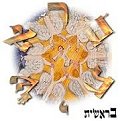
10.28.16 (Tishri 26, 5777) "Great is our Lord, and abundant in power; his understanding is infinite" (Psalm 147:5). All things work according to God's sovereign purposes, from beginning to end, so that what might seem to be trivial or insignificant at the time brings in its train other events, and these events cause yet further events, and so on and on. So it is with faith: a small beginning, a quiet prayer groaned within the depths of the heart, can move the hand of God and change the world.
בָּרוּךְ אַתָּה יְהוָה אֱלהֵינוּ מֶלֶךְ הָעוֹלָם
שֶׁהַכּל בָּרָא לִכְבוֹדוֹ
ba·rukh · at·tah · Adonai · E·lo·hey·nu · me·lekh · ha·o·lam
she·ko·cho · u'ge·vu·ra·to · ma·lei · o·lam

"Blessed are you LORD our God, King of the Universe,
whose strength and power fills the world."
Back to the Beginning...

10.28.16 (Tishri 26, 5777) Often it seems that we take one step forward, two steps back, revisiting the waste places of our old thinking and feeling the sting our character defects... Unfortunately this experience is common enough, since we often forget that change does not come from "reforming" the old nature, but by trusting that God makes all things new, and reckoning that our old nature is dead, buried and gone in Messiah (Gal. 2:20). Should we forget this and attempt to rectify the incurable, however, it is inevitable that we will be scandalized over our old depravity and we will need to go back to the beginning. However do not despair, dear one. The first step is most decisive. A chasid once lamented to the Baal Shem Tov that though he worked hard to be observant in his faith, he was still an sinful, ordinary and ignorant man. "Not true," said the Baal Shem Tov. "You now realize that you are a sinful, ordinary, and ignorant man, and that is an improvement" (Socrates would have agreed). Likewise Yeshua came not save the so-called righteous, but sinners to repentance (Mark 5:32). The way of healing is to going back to the beginning, turning to God in our need of heart and confessing the truth that in God alone is our salvation.
Where it is written, "How long shall I take counsel in my soul, having sorrow in my heart daily" (Psalm 13:2), the sages remark that just as long as we take counsel in our own soul there will be such sorrow, since only after we realize that no further counsel can help us do we give up and confess our need for God's salvation. Therefore בְּטַח אֶל־יְהוָה בְּכָל־לִבֶּךָ, "trust in the LORD with all your heart, and do not lean on your own understanding" (Prov. 3:5). Mammash - trust in the LORD!
Yeshua does not represent the "Second Coming of Moses"; nor did our Savior die on the cross so that we would become entangled in the old ways of thinking and being... Following Yeshua is not a religion of "moral reformation" or self-improvement designed to propitiate us before God. No, forever no! Yeshua is LORD and Master and we find new life in His acts of deliverance done on our behalf and for our benefit. The temptation is always to go back to the "law of sin and death" (i.e., the principle of self-justification), but as Luther once said: "The sin underneath all our sins is the lie of the serpent that we cannot trust the love and grace of Christ and that we must take matters into our own hands." Dear friends, we never get past our need for the cross... the crucified life is the way of sanctification.
Do not lie to one another since you have "stripped off" and "disarmed" (ἀπεκδύομαι) the old nature with its practices" (Col. 3:9); but "clothe yourself with the new nature that has been created in God's image – in righteousness and holiness that comes from truth" (Eph. 4:24).
Vanity and Creation...

10.28.16 (Tishri 26, 5777) It is written in our Scriptures: "Man is born to trouble as surely as the sparks fly upward" (Job 5:7), and therefore the question was raised by the sages as to whether life was worth living… In light of the ongoing trouble and wickedness of mankind, the early sages Hillel and Shammai engaged in a protracted machlochet l'shamayim ("a debate for the sake of heaven") regarding whether it would have been better for humans not to have been created at all... Hillel argued that it was better that humans had been created, whereas Shammai argued the other way. Finally a vote was called for and the decision rendered was this: It would have been better for humans not to have been created than to have been created. However, since we do in fact exist, we must search our past deeds and carefully examine what we are about to do (Eruvin 13b). Many people complain that they have no reason to live, though it may be better for them to complain that they have no reason to die... Paradoxically life in this world progressively diminishes in value the more we value it as our ultimate concern. Without a prophetic vision of eternal good and consummate healing, present suffering may indeed seem intolerable.
The searching and poignant debate between Hillel and Shammai is not trivial, nor should it be dismissed out of hand. After all, the great King Solomon, described in Scripture as the wisest man on earth, exclaimed, הֲבֵל הֲבָלִים הַכּל הָבֶל / havel havelim, hakol havelim ("Vanity of vanities, all is vanity," Eccl. 1:2). But is life really vain? Is it truly empty of lasting meaning? Is it, as Shakespeare once said, a "tale told by an idiot, full of sound and fury, signifying nothing"? As William James once arsked, is life really worth living, after all?
For more on this see: "Vanity and Creation: Further thoughts on parashat Bereshit."
Seedbed of Creation...
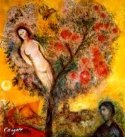
[ The following is related to our Torah portion for this Shabbat, parashat Bereshit... ]
10.28.16 (Tishri 26, 5777) The Scroll of Genesis (סֵפֶר בְּרֵאשִׁית) is truly the "beginning," the "root," and the "seedbed" of all the subsequent Scriptures - including the message of Yeshua and the revelation of the New Testament. In Genesis we see the creation and ruin of man through sin, but we take hold of the promise of deliverance through the coming Seed of the woman; in the Book of Exodus (שְׁמוֹת) we see God's powerful redemption secured through the blood of the Lamb; in the Book of Leviticus (וַיִּקְרָא) we encounter communion and atonement in the holy sanctuary; in the Book of Numbers (בַּמִדְבַּר) we experience the leading of God through desert places, and in the Book of Deuteronomy (הַדְּבָרִים) we are renewed by God's faithfulness before we take hold of our inheritance. Ultimately, the concluding book of the Bible, the Book of Revelation, serves as a climactic "final chapter" of the story begun in Genesis, where the Tree of Life (עֵץ הַחַיִּים) is restored to the midst of the paradise of God, and the presence of sin and death have been forever eradicated....
For more on this subject, please see: Genesis and the Seedbed of Creation.
Olam Malei - An Entire World...

[ The following is related to our Torah portion for this week, parashat Bereshit... ]
10.28.16 (Tishri 26, 5777) God made you entirely unique, and no one else was created for the special role that you have in the overarching plan of Almighty God... Jewish tradition says that God created Adam alone as "olam malei" (עוֹלָם מָלֵא), "an entire world," to teach that each individual is of great value and significance. "Thus anyone who sustains one individual has sustained the world; and anyone who destroys one individual has destroyed an entire world" (Sanhedrin 37a). In addition, God created man as a solitary creation to remind all people that they descend from a common source: No one has a greater or better lineage or "pedigree" than anyone else. Moreover, each of us is created with a radical sense of "aloneness," a built in "hunger" for relationship and especially for God's presence. Therefore the very first commandment to Adam and Eve comes in the form of a blessing: "And God blessed them and said, פְּרוּ וּרְבוּ / pru urvu: "be fruitful and multiply" (Gen. 1:28). People were created to be in fellowship with others and with God, and when this is lacking, there is a profound soul hunger and need....
The Nucleus of Reality...

10.28.16 (Tishri 26, 5777) God is "bereshit" (בְּרֵאשִׁית), the Beginning, the Starting Point, the Head, the Will, the Source, the Ground, the Foundation, the Supreme Presence, the originating Reality, the Rock of Ages, the Truth, the Greatest and Utmost, just as He is also the Focus, the Midst, the Center, the Core, the Nucleus, the Heart (לִבָּה) and the inner Meaning and Essence of Reality... Indeed God is the End, the Goal, the Telos (τέλος), the Destiny, the Purpose, the Climax, the Direct Object and Consummation of all and everything that exists. The LORD is our Redeemer, our Healer, our Savior, our Beloved; He forever prepares a place for us. In light of this truth, Torah consciousness may be expressed in two key verses of Scripture: "I shall set the LORD always before me" (Psalm 16:8) and "Know God in all your ways" (Prov. 3:6). God is our Great Reward, the Fulfillment of all our deepest dreams. "For since the beginning of the world men have not heard, nor perceived by the ear, neither has the eye seen, a God beside You, and what He has prepared for the one who waits for Him" (Isa. 64:4; 1 Cor. 2:9), which the sages interpret to mean that God will bless those who wait for Him to know the Divine Presence in everything that exists in all worlds.
Our Lord testified that He is the Aleph and the Tav, the First (rishon) and the Last (acharon), and the Beginning (rosh) and the Ending (sof): "I am the Aleph and the Tav, the beginning and the end, the first and the last" (Rev. 22:13). When Yeshua said this, he was clearly making a direct reference to Isaiah 41:4, 44:6, and 48:12, where YHVH Himself says that He is the First and the Last, and there is no other Savior beside Him.
Yeshua also testified that He embodied the very Truth of God: "I am the way and the truth and the life; no man comes to the Father apart from me" (John 14:6). Notice that the Hebrew word for truth (i.e., emet: אֱמֶת) contains the first letter Aleph (א), the middle letter Mem (מ), and the last letter Tav (ת) of the Hebrew alphabet, which the Jewish sages say implies that the truth contains everything from Aleph to Tav. Pontius Pilate's famous question, "What is truth?" is a category mistake, since truth is not about "what" but about "Who." That is, truth is not something objective and static, a thing to be known and studied from a distance. No. Truth is essentially personal. It is personal disclosure of the character of the subject. Understood in this way, truth is a way of living, a mode of existence, a relational truth.
בָּרוּךְ אַתָּה יְהוָה אֱלהֵינוּ מֶלֶךְ הָעוֹלָם
שֶׁהַכּל בָּרָא לִכְבוֹדוֹ
ba·rukh · at·tah · Adonai · E·lo·hey·nu · me·lekh · ha·o·lam
she·ha·kol · ba·ra · likh·vo·do

"Blessed are you LORD our God, King of the Universe,
who creates all things for his glory."
Providential Creation...
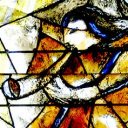
10.27.16 (Tishri 25, 5777) When you feel discouraged or anxious because of difficult times, remember how the LORD God created the world and sustains it for the sake of the revelation of his love for you... You may not understand the present moment, though you can assuredly trust that God's salvation given in the Messiah Yeshua heals you forever and ever. Declare at all times, then: "The world was created for my sake, though I am but dist and ashes." God is faithful, the great Amen of the human heart's cry. Your inner being is redeemed by God for you to experience and know the blessing of eternal life (John 17:3).
בָּרוּךְ אַתָּה יְהוָה אֱלהֵינוּ מֶלֶךְ הָעוֹלם
שֶׁהַכּל נִהְיָה בִּדְּבָּרוֹ
ba·rukh · at·tah · Adonai · E·lo·hey·nu · me·lekh · ha·o·lam
she·ha·kol · ni·he·yah · bi·de·va·ro

"Blessed are you LORD our God, King of the Universe,
who brings about everything by His Word."
Because you are made in the image of God, you are mikdash me'at, a small sanctuary or "temple" for the LORD (Luke 17:20-21; Rom. 14:17; 1 Cor. 6:19).
Axiom of Existence...

10.27.16 (Tishri 25, 5777) The sages explain that the Torah begins with the words "in the beginning God created" (בְּרֵאשִׁית בָּרָא אֱלהִים, Gen. 1:1) because the foundation and axiomatic starting point of all genuine knowledge begins with the Reality that God is the sole Creator of everything that exists. The Kobriner Rebbe turned to his students and said, "Do you know where God is?" He then took a piece of bread, showed it to them all and continued, "God is in this piece of bread, for without the Lord's manifestation of His power in all of nature, this very piece of bread would have no existence." Amen, as our Scriptures attest: "in Him we live, and move, and have our being" (Acts 17:28), and "of Him, and through Him, and to Him, are all things: to whom be the glory for ever. Amen" (Rom. 11:36).
בָּרוּךְ אַתָּה יְהוָה אֱלהֵינוּ מֶלֶךְ הָעוֹלם
עשֶׂה מַעֲשֵׂה בְרֵאשִׁית
ba·rukh · at·tah · Adonai · E·lo·hey·nu · me·lekh · ha·o·lam
o·seh · ma·a·seh · ve·rei·sheet

"Blessed are you LORD our God, King of the Universe,
who makes the wonders of creation."
Creation and Faith...
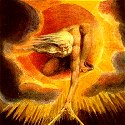
[ The following entry is related to parashat Bereshit. It is a bit "philosophical," so please skip over it if you do not find it helpful! Shalom and love to you, chaverim... ]
10.27.16 (Tishri 25, 5777) The idea that a personal God created the universe "out of nothing" (i.e., yesh me'ayin: יֵשׁ מֵאַיִן ) is a matter of special revelation that is not directly known through the operation of unaided natural reason. Of course human reason may (rightly) infer that since "every effect requires a cause," and since the universe itself is an effect, there must be a cause sufficient for the existence of the universe. Likewise, human reason may again (rightly) infer that the universe itself must have had a beginning, since it is impossible to traverse an infinite number of causes to arrive at a present effect, and therefore there must have been an immensely powerful and transcendental "First Cause" that started the entire chain of causation itself. (This "First Cause" answers the metaphysical question, "Why is there something [at all] rather than nothing?") However, human reason, by itself, can only take us so far, and something more is needed to apprehend the nature of reality.
In philosophical theology, an argument that God is the Cause of the universe is sometimes offered to invoke the possibilty that the God of the Jewish Scriptures exists, though strictly speaking this inference is not warranted given the premises and logic of "cosmological" arguments alone. Indeed, the ancient Greek philosophers used this kind of reasoning to justify their own speculations about the cosmos (e.g., Plato's Form of the Good, Aristotle's Unmoved Mover, etc.), and yet their philosophical systems never connected the First Cause with a morally perfect personal Creator (אֱלהִים) who made mankind in His image and who therefore requires loving trust to know Him. The Greek conception of God (θεὸς) was abstract, impersonal, and essentially a theoretical construct employed to make sense of the physical cosmos. Nowhere in their speculations will you find the idea that the First Cause has revealed Himself as the Source of all moral truth in the universe and who therefore functions as mankind's Eternal Judge. And nowhere in their thinking will you find the Covenant-Making God (יהוה) who redeems humanity from sin and judgment by means of the atoning sacrifice of Yeshua on the cross... Beyond the abstract awareness that the universe is the effect of an immensly powerful and transcendental First Cause, unaided human reason has precious little to say. As the French mathematician Blaise Pascal once wrote, "The God of the philosophers is not the God of Abraham, Isaac, and Jacob."
The great contribution of Hebrew thinking is grounded in personal revelation from the Supreme power of the Universe. Instead of ancient Greek pholosophical speculation that occurred much later in history (Abraham dates from 2,000 BC whereas the classical Greeks began their metaphysical investigations in 500 BC), the ancient Hebrews understood reality as the handiwork of a single all-knowing, all-powerful, and morally perfect Creator who has personally revealed Himself to key individuals in the drama of human history. As such, reality is intensely, overwhelmingly, and even hauntingly personal... Truth therefore is a matter of trust -- not abstract knowledge -- whereas "knowledge" is primarily about practical ethics, moral obligation, and cult practices (i.e., Temple worship). For the Hebrew mind, truth is more akin to moral fidelity than it is to propositional correspondence; it is more a matter of the heart than of the head (for more on this, see "Theology and the Greek Mindset").
A Roman emperor once asked Rabbi Joshua if the universe had a ruler. The sage answered, indeed, the LORD is the Creator of all things, as it is written, "In the beginning, God created the heavens and the earth." The emperor then asked, "Why is God not like the emperor of Rome, who is seen twice a year so that people may know and worship him?" Rabbi Joshua said that unlike human kings, the LORD was too powerful for people to see; as it is written in the Torah: "No person shall see Me and live." The emperor was skeptical, however, and insisted that unless he could physically see God, he would be unable to believe. Rabbi Joshua then pointed to the sun high in the sky: "Look into the sun and you will see God." The emperor tried to look into the sun, but was forced to cover his eyes to keep them from burning: "I cannot look into the sun," he said. Joshua then replied: "Listen to yourself: If you cannot look into the sun which is but one of God's creations, how can you expect to look at God?"
(adapted from the Sefer HaAggadah)
The New Testament affirms that knowing that the First Cause of the universe is the personal God revealed in the Jewish Scriptures is the result of faith in God's direct revelation: "By faith (בָּאֱמוּנָה) we understand that the universe [lit. "worlds"] were created by the utterance of God (בִּדְבַר אֱלהִים), so that what is seen [i.e., the "effect" of the universe] did not come into being out of existing phenomena [i.e., was made yesh me'ayin - 'out of nothing']" (Heb. 11:3). Again, this is a matter of special revelation directly imparted by God's grace so that the soul may apprehend the Divine Light that preceded the creation of the worlds. Faith "looks not to the things that are seen but to the things that are unseen. For the things that are seen are transient, but the things that are unseen are eternal" (2 Cor. 4:18). This "collision" with the world of everydayness creates a restlessness or homesickness for our true home in heaven... (May God help each of us persevere.)
The very first phrase of the Scriptures, "In the beginning God created..." (Gen. 1:1), is therefore the starting point of all true and right thinking about the universe itself. Everything else follows from this revealed truth which natural (i.e., human) reason can merely approximate. God alone can create yesh me'ayin - "out of nothing" (the Hebrew verb bara (בָּרָא) is used exclusively to refer to God's power in this way), and therefore God stands exaltedly apart from the universe as its unique Creator and personal Master. This is the guiding thought that overshadows all that follows in the pages of Scripture. God is holy - separate - and entirely unique. He is the Personal God who loves, wills, speaks, intends, etc., and to whom human beings owe their allegiance and life. The God of Israel is not some indifferent deity that functions as a theoretical construct to explain the universe: He is the Source of all life, the personal Judge and Redeemer of all people.
All-Sustaining Presence...
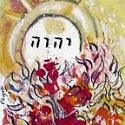
[ The first occurrence of the Name YHVH (יהוה) concerns the creation of Adam (Gen. 2 :4)... ]
10.27.16 (Tishri 25, 5777) The Name of God, YHVH (יהוה), means "Breath" (Gen. 2:7; Num. 16:22), "Presence" (Exod. 3:13-14), "Life" (Deut. 30:20), and "abundant Compassion and Truth" (Exod. 34:6-7), but it also means the "I-AM-WITH-YOU One" who keeps His promises. The Name YHVH means that "God was (i.e., hayah: היה), God is (i.e., hoveh: הוֶה), and God always will be (i.e., veyihyeh: וְיִהְיֶה)," which implies that He is ever present and not restricted by time or space. Moreover, God is called havayah (הֲוָיָה), which means He is continually sustaining creation by the Word of His power. As our Sciptures state: "In Him we live, move, and have our being" (Acts 17:28; Heb. 1:3). As it is poetically expressed in the Psalms, "Behind and before you besiege me; You lay your hand upon me."
אָחוֹר וָקֶדֶם צַרְתָּנִי
וַתָּשֶׁת עָלַי כַּפֶּכָה
a·chor · va·ke·dem · tzar·ta·ni
va·ta·shet · a·lai · ka·pe·khah

"Behind and before You besiege (cover) me;
You lay your hand upon me."
(Psalm 139:5)

Download Study Card
"Behind and before you besiege me." The word "behind" is the preposition achor (אָחוֹר), a word related to the word acharon (אַחֲרוֹן), "west," though it also refers to something later (אַחֲרֵי), such as a later place or time (אַחֲרִית). In Hebrew, the preposition generally means "backward" (לאחור) or "behind" (מאחור). God's got your back, friend... Note further that the word translated "before" is kedem (קֶדֶם), a preposition that means "east" but also refers to the primordial beginning, the dawn. The root verb kadam (קָדַם) means to "meet" in initial contact. God is always present for you, friend, and that includes times and days that lie ahead, in the distant future... As far as the east is from the west, so far does God's compassion and love cover you, surround you, and sustain you (Psalm 103:12).
"You besiege me." The verb tzartani (צַרְתָּנִי) comes from the root tzur (צור) that means to encircle, to press upon, to "pressurize," as by relentlessly attacking a stronghold. The image is that God "hems us in," that is, He surrounds us and shelters us with His Presence – so that we cannot escape: You are under God's supervision and protection, friend... And while the root tzur can imply tzuris (trouble, affliction), in this context it is used to picture the Lord securing our station, preserving, protecting, and defending our way. "You lay your hand upon me." God's personal and providential hand is at work in your life – He is HaMashgiach hagadol (הַמָּשְׁגִיחַ הַגָּדוֹל) - the Great Overseer of the universe, and that means your way is as sure and secure as the very power that God's own will affords.
"If there be anywhere on earth a lover of God who is always kept safe from falling, I know nothing of it - for it was not shown me. But this was shown - that in falling and rising again we are always kept in the same precious love." - Julian of Norwich
"We cannot fall beneath the arms of God. However low we fall, they are underneath us still." - William Penn
Thank God for His providential and all-pervasive care for your soul. He is the LORD of all time and space, and that means He is an ever-present help to bring you safely back home...
In the Beginning...

10.27.16 (Tishri 25, 5777) Our Torah portion for this week re-opens the Bible with these famous words: "In the beginning, God created the heavens and the earth" (Gen. 1:1). Notice, however, that the Hebrew word translated as "beginning" (i.e., bereshit: בְּרֵאשִׁיתּ) logically does not mean a point in chronological time, since time, regarded as the measurement of motion, is inextricably connected to existence and came into being with creation itself. Time and being are therefore linked. Therefore, it is better to understand bereshit to mean "with wisdom," since the word is based on the root idea of rosh (ראשׁ, "head," or "chief"), which suggests what is most important, i.e., "at the head of (all things)," "bechor," etc.
Another way to read this statement is to notice the direct object marker (אֵת) of the verb bara (בָּרָא) in the first verse. Read literally, it would say, "With wisdom (or "within his own mind or counsel") God created all things - Aleph through Tav - namely, the heavens and the earth." Some have said the direct object marker here refers to Yeshua, and while it is indeed true that He is the Aleph and Tav (Rev 1:8), the Direct Object of the Universe -- "the One who is and who was and who is to come, the Almighty" -- in this verse he is Elohim (אֱלהִים), our Creator, which agrees with many other Scriptures such as Col. 1:15-17, Heb. 1:1-3; John 1:1-14; Eph 1:21; Phil. 2:9-11, Rom. 14:11 (with Isa. 45:22-24); Rom. 11:36, etc. Others have said "Aleph-Tav" here refers to the holy alphabet, the power from the Word.
 |
The Gospel in the Garden...

[ The following is related to the "Circle of Torah" and parashat Bereshit... ]
10.26.16 (Tishri 24, 5777) The very first prophecy of the Bible was spoken to the serpent, namely, God's promise that through the "seed of the woman" would come One who would battle the serpent and ultimately crush the kingdom of Satan (Gen. 3:15). Notice that the promise of the coming "Serpent Slayer" was given to Adam and Eve before their judgment was announced. And even after their judgment was given, "the LORD God made tunics of skin for Adam and his wife and clothed them" - a clear picture of being compassionately "robed in righteousness" imparted by an innocent sacrifice. The very first sacrifice recorded in the Torah - performed by God Himself - prefigured the coming redemption by the "seed of the woman" who would die as a substitutionary sacrifice for their sins.
"God creates the cure before the plague." Just as God created mankind only after He created the pathway of repentance (i.e., Yeshua is called the "Lamb slain from the foundation of the world": 1 Pet. 1:20, Eph. 1:4, Rev. 13:8), so purification from death and the nullification of the curse was also foreseen and provided by the cross of the Messiah. Yeshua is the antidote to the venom delivered through the serpent's bite (John 3:14-15). "For as in Adam all die, so also in Messiah shall all be made alive" (1 Cor. 15:22). The "new seed" of life given to us in Yeshua makes us into a "new creation" (בְּרִיאָה חֲדָשָׁה) that fully restores the defaced image of God within us: "Just as we have borne the image of the man of dust, we shall also bear the image of the man of heaven" (1 Cor. 15:49).
Note: For more on this, please see "The Gospel in the Garden."
Mystery and Creation...

[ The following is related to our Torah portion for this week, parashat Bereshit. Please review the Torah portion to find your place here... ]
10.26.16 (Tishri 24, 5777) Why is there something rather than nothing? Why does anything exist at all? These are basic questions about the meaning of life. Where do we come from? What are we? Where are we going? "God created the universe," you say, yes, but exactly why did He do so? What purpose did he have in mind? In particular, why were you created? What is the purpose of your life? What do you hope to achieve with the limited amount of time you have on this earth? Such questions brood within the soul, even if they are hidden from consciousness by various forms of busyness and distraction. At the outset of serious thinking about anything at all we are confronted with such ultimate questions. What is real? Why are we here? Where are we going? What does God want from us?
"Where am I? Who am I? How did I come to be here? What is this thing called the world? How did I come into the world? Why was I not consulted? And If I am compelled to take part in it, where is the director? I want to see him." - Soren Kierkegaard
The Torah begins: "In the beginning God created..." (Gen. 1:1). No explanation is given, simply the mysterious declaration that God's eternal power is behind the realm of the world of appearances. We only begin to get some idea of God's hidden purposes as he reveals his design in Scripture. There we learn that God chose to create the universe yesh me'ayin, "out of nothing," in order to share his wisdom, glory, and love with other beings He created. "You created all things, and for Thy pleasure they are and were created" (Rev. 4:11). All this was for the sake of the Messiah, who built the world in chesed (חֶסֶד) and who forever reigns as the King of eternal life and love. "For from him and through him and to him are all things" (Rom. 11:36). The purpose of your life is to learn that you are beloved by God, to know and receive the infinite worth you have in his eyes, and to share that love with others. Indeed, you were created to be made part of God's great family, the Kingdom of Love...
For more on this topic see: "Creation and the Kingdom of Love..."
The Virtue of Questions...

10.26.16 (Tishri 24, 5777) A good teacher doesn't feed students answers but rather provokes them to ask their own questions and to think for themselves... In that sense, a good teacher is like an "intellectual midwife," there to assist the one who explores the meaning of questions. This is especially true regarding matters of spiritual life: "There are many people who arrive at conclusions in life much the way schoolboys do; they cheat their teachers by copying the answer book without having worked the problem themselves." Merely "having the answer" does little spiritual good if the weight of the question that it proposes to address is not fully understood. As Kierkegaard said regarding all the so-called "Bible answer men" -- "The most fatal thing of all is to satisfy a want which is not yet felt, so that without waiting till the want is present, one anticipates it, likely also using stimulants to bring about something which is supposed to be a want, and then satisfies it. And this is shocking! And yet this is what so many clergy do, whereby they really are cheating people out of what constitutes the significance of life, and instead helping them to waste it."
There is a temptation, then, for those who regard themselves as teachers or preachers to get ahead of the need, to over-anticipate, and therefore mislead those they hope to help. On the other hand, many are too busy (or too proud) to marvel over the sheer wonder of existence itself and grow impatient (or even threatened) with questions like these. They don't take the time to reflect about why they were born, what purpose is connected with their life, or where they are going, until they are confronted with suffering and trouble. Sometimes we must "comfort the afflicted and afflict the comfortable."
Instead of regarding the Bible as a "Book of Answers" for our questions, it is worthwhile to think of it as a "Book of Questions" for our answers. As we listen, God questions us so that we can know him by means of the dialog within our hearts. As any good teacher knows, when a student earnestly wrestles with a question he learns more than if he were given a straightforward answer. Similarly, the Lord gives us permission to be without answers so that we will be free to seek, to struggle, and to "own" what we come to understand through our relationship with him... That way our learning will be real, substantive, and born from the urgency our own inner need. Indeed, God's very first question to man is always, ayekah: "Where are you?" (Gen. 3:9), which appeals for us to acknowledge how we hide from the truth. "Where are you?" is the poignant call of the Seeking Father for his lost child, and the question only becomes "our own" when we are willing to look at how we've come to be at this place in our lives. God's question to our heart is meant to lead us out of hiding to respond to his loving call...
Everything is inherently mysterious, since everything ultimately expresses the inscrutable will and decrees of God.... Ask yourself with earnestness of heart: Where do I come from? Who am I? Where am I going? For what reason was I created? The first step is to wonder, to ask the searching questions, and to seek God's wisdom... The LORD is faithful and will reveal truth to the heart that seeks.. It is too easy to be preoccupied with everyday concerns and to miss the marvel and sheer wonder of existence itself. If you will approach these questions with humility and reverence, you will be filled with wonder, your heart will be filled with greater fervor, and you will hunger more than ever for God's Presence.
Turn Away from Fear...
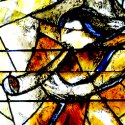
10.26.16 (Tishri 24, 5777) The "world" (κόσμος) is a place of fearful exile from the Lord. To find healing, turn away from its faithless messages of terror and manipulation and consciously listen (shema) to the promises of God. "He who abides in the secret of the Most High will dwell in the shadow of Shaddai" - ישֵׁב בְּסֵתֶר עֶלְיוֹן בְּצֵל שַׁדַּי יִתְלוֹנָן (Psalm 91:1). The "midst of the dark cloud" (Exod. 24:18) is a place of sacred and holy concealment. The LORD will save you from the ensnaring trap and from the devastating pestilence: "Because you have made the LORD your dwelling place-- the Most High (עֶלְיוֹן) who is my refuge, no evil shall be allowed to befall you, no plague come near your tent. For he will command his angels concerning you to guard you in all your ways" (Psalm 91:9-11).
כִּי־אַתָּה יְהוָה מַחְסִי עֶלְיוֹן שַׂמְתָּ מְעוֹנֶךָ
לא־תְאֻנֶּה אֵלֶיךָ רָעָה וְנֶגַע לא־יִקְרַב בְּאָהֳלֶךָ
כִּי מַלְאָכָיו יְצַוֶּה־לָּךְ לִשְׁמָרְךָ בְּכָל־דְּרָכֶיךָ
ki · at·tah · Adonai · mach·si · Elyon · sam·ta · me'o·ne·kha
lo · te'u·neh · e·le·kha · ra'ah · ve'ne·ga · lo · yik·rav · be'o·ho·le·kha
ki · mal·akh·av · yetz·a·veh · lakh · lish·mor·kha · be'khol · de·ra·khe·kha

"Because you have made the LORD your dwelling place -- the Most High who is my refuge, no evil shall be allowed to befall you, no plague come near your tent. For he will command his angels concerning you to guard you in all your ways."

Faith brings to life the prophecy: "You will not fear the terror of the night, nor the arrow that flies by day, nor the pestilence that stalks in darkness, nor the destruction that wastes at noonday... because you have made the LORD your dwelling place."
The so-called "security" of man is an illusion; the promises of politicians are vain and untrustworthy... Turn away from the fears common to the faithless denizens of this world. Rise above the lies and violence of men! God's truth is your strength and your shield (Psalm 91:4). Repent of your fear and ask the LORD Most High, the Ascended One, to cover you with the glory of his presence. And may He shelter you under His wings, and may you find refuge in His truth - his sword and shield!
Note: By "world" I mean the idea of κόσμος, that is, the political and economic sphere, the realm of ideology, propaganda, fake news, fashion, fads, pop culture and its idolatry, mass educational indoctrination, etc. We are delivered from this evil world to become members of God's kingdom of light and love (Col. 1:13). We turn away from the clamor of man's illusions to focus on God's sovereign power: For thus said the Lord GOD, the Holy One of Israel, "In returning and rest you shall be saved; in quietness and in trust shall be your strength."
The Song of Desire...

[ The following is related to our Torah portion for this week, parashat Bereshit... ]
10.26.16 (Tishri 24, 5777) The midrash says that the word "bereshit" (בְּרֵאשִׁית) can be arranged to spell shir te'ev (שִׁיר תְּאֵב), meaning the "song of desire." This is the holy plea sounded by all of creation to be made whole, healed, and ultimately perfected. As it says in our Scriptures: "For the creation was subjected to futility, not willingly, but because of him who subjected it in hope" (Rom. 8:20). Therefore when we take hold of Yeshua's heart, vision, and mission, we partake in the repair of the world (תיקון עולם) by testifying of God's healing love given in Messiah. We begin and end our journey to life with the "song of desire" on our lips – that is, with our heart awakened to its need for God. As it says: "The LORD is near to all who call on him, to all who call on him in truth. He fulfills the desire of those who fear him; he also hears their cry and saves them" (Psalm 145:18-19).
אֲנִי לְדוֹדִי וְעָלַי תְּשׁוּקָתוֹ
ani · le'do·di · ve·a·lai · te·shu·ka·to

"I am my beloved's, and his desire is upon me."
(Song 7:10)

The Delight of Torah...
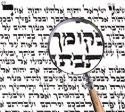
[ During the holiday called Simchat Torah we both celebrate the completion of the year's Torah Reading cycle as well as the start of a new cycle... ]
10.26.16 (Tishri 24, 5777) God is not the "author of confusion," and that means that rational intelligibility is foundational to divine revelation. "The Torah was written in the language of men," which is to say, it expresses ideas people can understand. The Scriptures declare: "Blessed is the man who ... delights in the Torah of the LORD (בְּתוֹרַת יְהוָה); all that he does shall prosper" (Psalm 1:1-3). And while it is true that we are no longer 'under' the terms of the covenant given at Sinai (Rom. 3:23), we still delight 'in' the Torah and meditate on its precepts day and night (Psalm 1:2; 19:8; 119:15, 47, 97; Neh. 8:12, etc.). After all, Torah "written upon the heart" is a mark of the New Covenant believer (Jer. 31:31-33). As it is written in Proverbs: "If you seek it [i.e., the wisdom revealed in the Torah] like silver and search for it as for hidden treasures, then you will understand the fear of the LORD and find the knowledge of God" (Prov. 2:4-5). If worldly men seek money and riches for life in this world, should we be less earnest in our pursuit of true and eternal riches?
Furthermore, where it is written, "all Scripture is breathed out by God (θεόπνευστος) and is profitable for teaching, for reproof, for correction, and for training in righteousness, that the man of God may be complete, equipped for every good work" (2 Tim 3:16-17), it is evident that the Scriptures referred to here are the Jewish Scriptures (i.e., the Torah, the Prophets, and the Writings), since they are the foundation, the context, and the overarching matrix for the later New Covenant revelation... These were the Scriptures Yeshua used to contextualize and explain his ministry to his followers: "And beginning with Moses and all the Prophets, he interpreted to them in all the Scriptures the things concerning himself" (Luke 24:27; John 1:45). In other words, the Torah has both a logical, a linguistic, and a theological priority regarding our understanding of the New Testament Scriptures, and the failure to read in context invariably leads to faulty interpretations and doctrinal errors of various kinds. "To the Jew first, and [then] to the Greek" (Rom. 1:16) is a principle not only of how the gospel message would transcend ethnic Israel to be offered to all the nations, but also about how we should approach the practice of Biblical interpretation.... This much is axiomatic: God "breathed out" (θεόπνευστος) his revelation in order, and the message itself must be understood in light of that order (John 4:22).
Since Yeshua the Messiah is Torah Ha'Emet - the True Torah - we should likewise celebrate the "Joy of Torah" in our lives. He is the Living Torah, the Living Word, written upon our hearts so that we can truly dance and embrace the Truth given from God. Indeed, Yeshua did not come to destroy the Torah but rather to fulfill it in our lives (Matt. 5:17-20).
Creation for the Messiah...

[ The following is related to our Torah portion for this week, parashat Bereshit... ]
10.25.16 (Tishri 23, 5777) The Talmud says "All the world was created for the Messiah" (Sanhedrin 98b). Likewise the New Testament had earlier said: "All things were created by Him (i.e., Yeshua), and for Him" and in Him all things consist (συνεστηκεν, lit. "stick together") (Col. 1:16-17). The first word uttered by God, "Let there be light" (Gen. 1:3), was uttered on behalf of all who would behold His glory, as it is written, "Arise, shine forth, for your light has come" (Isa. 60:1). When Adam first opened his eyes and human consciousness was born, he immediately understood that the LORD created all things, including himself. According to midrash, Adam's first words were, יהוה מֶלֶךְ עוֹלָם וָעֶד / Adonai malakh olam va'ed: "The LORD is King for ever and ever." God then said, "Now the whole world will know that I am King," and He was very pleased. This was the "tov me'od" (טוֹב מְאד) moment of creation, when God saw all that He had made "and found it very good" (Gen. 1:31). Therefore the name for man (i.e., adam: אָדָם) is connected with the word for "very" (i.e., me'od: מְאד): the birthday of humanity is therefore the Coronation Day for the King of the Universe.
The implication that God is our Creator is enormous and pervades everything else in our lives. God's creative power is witnessed by all conscious life. The Divine Light that was created before the sun and the stars represents God's immanent presence that "lights up" all of creation - including our minds (Gen. 1:3). Since we were created b'tzelem Elohim, "in the image of God," the witness of God's truth is foundational to all of our thinking as well. The revelation (not the invention) of logical first principles is part of God's "signature," if you will, of how the mind is wired to reality. Likewise we have intuitive awareness regarding the existence of moral truth (i.e., the standard of justice and moral law), aesthetic truth (i.e., ideals of beauty, goodness, worth, and love), and metaphysical truth (i.e., cause and effect relationships). "The heavens are recounting the glory of God, and the expanse is proclaiming his handiwork" (Psalm 19:1). God's power and presence can be clearly inferred from the tremendous effect of the universe itself. As Paul stated, "the invisible things of Him (τά ἀόρατα αὐτοῦ) from the creation of the world are clearly seen (καθοράω), so that people are without excuse" (Rom. 1:19-20). It is the fear of the LORD (יִרְאַת יהוה) that is truly the beginning of wisdom and knowledge (Psalm 111:10; Prov. 1:7; 9:10). The Hebrew word for fearing (ירא) and seeing (ראה) share the same root. We cannot truly see reality apart from reverencing God as the Lord and King of Creation.
It was asked for what purpose mankind was created. One said to purify the soul; another said to gain wisdom; another to serve God. Nay, but understand that man was created to elevate the heavens, to celebrate the heart of the Father, and to be needed by heaven's embrace... To focus on ourselves, on our purification, our "religion," misses the greater point that only God's love makes true life possible....
Spelling out "Bereshit"...
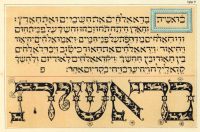
[ The following is related our Torah portion for this week, parashat Bereshit... ]
10.25.16 (Tishri 23, 5777) The 18th century Torah sage Vilna Gaon taught that the Hebrew word "bereshit" (בְּרֵאשִׁית), which is the very first word of the Bible, may be thought of as an acronym for meaningful spiritual life. The first letter, Bet (בּ), stands for bittachon (בִּטָּחוֹן), a word that means complete trust in God's love for your life; the next letter, Resh (ר), stands for ratzon (רָצוֹן), or the desire to live according to God's will; the central letter Aleph (א) stands for ahavah (אַהֲבָה), which is the love for God and for our fellow man (Deut. 6:5; Lev. 19:18); and the letter Shin (שׁ) is for shetikah (שְׁתִיקָה), or "keeping silent," which is the cardinal virtue of godly self-control and wisdom (James 1:26; 3:1-18; Psalm 34:13; Prov. 13:3, etc.). The letter Yod (י) is for yirah (יִרְאָה), or reverence for God's authority and dignity; and finally, the letter Tav (ת) is for Torah (תּוֹרָה), the study of which brings transformation and sanctity to your life (Psalm 19:7; Psalm 119:105; Prov. 6:23; Matt. 5:17-19; 2 Tim. 2:15-16).
The Divine Light...

10.25.16 (Tishri 23, 5777) The Scriptures reveal that the Word of God (דְּבַר הָאֱלהִים) created the universe and indeed all possible worlds (בְּרֵאשִׁית הָיָה הַדָּבָר). When the Divine Voice (i.e., the Word of God) spoke cosmic Light into existence (Gen. 1:3), God was not creating the physical light of the Sun or the stars since the heavenly bodies were created later (see Gen. 1:14). This supernal light was the first expression of God's handiwork outside of Himself, His first revelation of contingent existence (i.e., existence that owes its source, continuance, and end to God's transcendent power and will). The Divine Light formed the canvass, if you will, of God's portraiture of creation (in three-dimensional terms, the Divine Light formed a sort of "container" that became the "house" or "place" of Creation). Among other things, this means that ultimate reality is grounded in the Source of Light, Love, and Truth -- regardless of how dark the present hour may appear. Indeed God's Name YHVH (יהוה) means Being Itself (הָיָה וְהֹוֶה וְיָבוֹא): He is always present, and therefore we can call upon Him in our time of need (Heb. 4:16). For more on this subject, see "Covenant of Fire."
Torah's First Day...
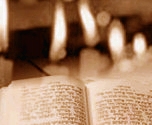
10.24.16 (Tishri 22, 5777) Concerning the account of creation of the first day (i.e., Gen. 1:3-5), the midrash notes the word light (אוֹר) appears five times, one for each of the five books of Torah: 1. "Let there be light" (יְהִי אוֹר) refers to the Book of Genesis (Bereshit) and how God created the world with light; 2. "And there was light" (וַיְהִי־אוֹר) refers to the Book of Exodus (Shemot), the light of redemption from the darkness of exile; 3. "God saw that the light was good" (וַיַּרְא אֱלהִים אֶת־הָאוֹר כִּי־טוֹב) refers to the book of Leviticus (Vayikra) and the sacrifices at the altar; 4. "God separated the light from the darkness" (וַיַּבְדֵּל אֱלהִים בֵּין הָאוֹר וּבֵין הַחשֶׁךְ) refers to the Book of Numbers (Bamidbar), and how Israel separated themselves from their past and how the clouds of glory illuminated their way; and finally, 5. "God called the light day" (וַיִּקְרָא אֱלהִים לָאוֹר יוֹם) refers to the Book of Deuteronomy (Devarim), the retelling of the Torah (מִשְׁנֵה הַתּוֹרָה), which distills the commandments that enlighten the heart of faith, as it says, "mitzvah is a lamp and the Torah is light" (Prov. 6:23).
A Prophetic Rejoicing...
 |
10.24.16 (Tishri 22, 5777) Regarding the holiday of Sukkot ("Tabernacles") the Torah states, ve'samchta be'chagekha - "you shall rejoice in your holiday" and ve'hayita akh same'ach - "you shall have nothing but joy" (Deut. 16:14-15). But how can Torah command us to rejoice? Can we be forced to dance, sing, and make merry? Holocaust survivor Elie Wiesel wrote, "Ve'samchta be'chagekha (וְשָׂמַחְתָּ בְּחַגֶּךָ) is said to be the most difficult commandment of Torah, but I could never understand why. Only during the war did I understand. Those Jews who, in the course their journey to the end of hope, managed to dance on Simchat Torah... taught us how Jews should behave in the face of adversity. For them, ve'samchta be'chagekha was one commandment impossible to observe -- yet they observed it."
In this connection, let me add that these words are ultimately prophetic: "you shall rejoice; you shall have nothing but joy...." That day is coming, when our tears are wiped away and our wounds are forever healed. Amen. Chag Sukkot Sameach, friends..
The Waters of Life...
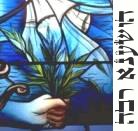
[ The following is related to the holiday of Sukkot, the "Feast of Tabernacles." ]
10.23.16 (Tishri 21, 5777) The seventh (and last) day of the festival of Sukkot is called Hoshana Rabba (הוֹשַׁנָא רַבָּא). Hoshana (sometimes transliterated as "Hosanna") comes from the Hebrew phrase hoshia na (הוֹשִׁיעָה נָּא), meaning "save us now," combined with "rabbah," meaning "great," to refer to a great corporate plea for salvation. It was on this climactic day of the festival that the people gathered at the Temple for the water ceremony, waving lulavs and circling the courtyard seven times (hakafot) while chanting "Ana Adonai - Hosiah na" (Psalm 118:25), "save us, we pray O LORD!" The New Testament records that it was also on the last day of Sukkot (i.e., "the great day") - perhaps during the water libation ceremony itself - that Yeshua stood up and cried out, "If anyone thirsts, let him come to me and drink. Whoever believes in me, as the Scripture has said, 'Out of his inmost being will flow rivers of living water'" (John 7:37-38; Isa. 12:3).
אָנָּא יְהוָה הוֹשִׁיעָה נָּא אָנָּא יְהוָה הַצְלִיחָה נָּא
בָּרוּךְ הַבָּא בְּשֵׁם יְהוָה בֵּרַכְנוּכֶם מִבֵּית יְהוָה
an·na Adonai ho·shi·ah na / an·na Adonai hatz·li·chah na
ba·rukh hab·bah be·shem Adonai / be·rakh·nu·khem mi·beit Adonai

"Save us, we pray, O LORD! O LORD, we pray, let us thrive!
Blessed is he who comes in the name of the LORD!
We bless you from the house of the LORD."
(Psalm 118:25-26)

Hebrew Study Card
The early sages had taught "at the feast of Sukkot judgment is made concerning the waters," referring to the rain needed for the forthcoming planting season. The historian Josephus calls the ceremonial drawing of water from the Pool of Siloam "the very sacred close (συμπέρασμα) of the year," since the amount of rainfall over the next few months would directly impact the harvest in the spring. The need for rain over the winter months in Israel was an ongoing need for the welfare of the people...
"With joy shall you draw water out of the wells of salvation" (Isa. 12:3). Yeshua once encountered a woman who had come to draw water from a well and said, "Everyone who drinks of this water will be thirsty again, but whoever drinks of the water that I will give him will never be thirsty again. The water that I will give him will become in him a spring of water welling up to eternal life" (John 4:13-14). Likewise he taught earlier in his ministry, "Blessed are those who hunger and thirst for righteousness, for they shall be satisfied" (Matt. 5:6). Just as the people understood they needed physical rain to sustain their physical lives, so Yeshua pointed to himself as the source of "spiritual rain," or "living water" that would sustain their spiritual lives. The "rain of blessing," then, referred to the refreshing power of the Holy Spirit that would become an inner source of life for those who believe... As Yeshua said, "out of his inmost being will flow rivers of living water," which some have thought refers back to the miraculous waters that were given in the desert: "Each soul will be a rock smitten in the thirsty land, from which crystal rivers of life-giving grace shall flow." Indeed the Hallel that is recited during the festival includes the verse: "He turned the rock into a pool of water, the flint into a fountain of waters" (Psalm 114:8).
The Narrator of Torah...

10.23.16 (Tishri 21, 5777) Since we are about to begin reading the Torah again for another year, it is worthwhile to remind ourselves about how the Torah itself begins... In this connection we note that it speaks from an omniscient, "third person" perspective. When we read, "In the beginning, God (אֱלהִים) created the heavens and the earth," we must ask who exactly is speaking? Who is the narrator of the Torah? The next verse states that the Spirit of God (רוּחַ אֱלהִים) was hovering over the face of the waters (Gen. 1:2), followed by the first "direct quote" of God Himself: i.e., יְהִי אוֹר: "Let there be light" (Gen. 1:3). The creative activity of Elohim (God) and the presence of Ruach Elohim (the Spirit of God) are therefore narrated by an omniscient Voice or "Word of God" (i.e., davar Elohim: דְּבַר הָאֱלהִים). Obviously the Spirit of God is God Himself, just as the Word of God is likewise God Himself, and therefore the first verses of the Torah reveal the nature of the Godhead. God is One in the sense of echdut, "unity," "oneness," and and so on, though not "one" in the monistic sense of a solipsistic mind (νοῦς). God is beyond all theological predications: there can be no sense of "person" apart from relationship, and therefore God's Personhood entirely transcends all our finite conceptions - and yet God forever is One....
Torah our Heritage...
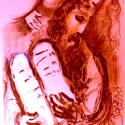
10.23.16 (Tishri 21, 5777) Our spiritual inheritance is bound up with the Torah: it is part of our story, our history, and our heritage as follows of Yeshua, the Jewish Messiah (Deut. 33:4; Matt. 5:17-19; Gal. 3:7; Rom. 4:16; Luke 24:27). הַיְשׁוּעָה מִן־הַיְּהוּדִים - "Salvation is of the Jews" (John 4:22). The stories, rituals, and laws of the Torah serve as parables and allegories that inform the deeper meaning of the ministry of Messiah: "Now these things happened to them as an example, but they were written down for our instruction, on whom the end of the ages has come (1 Cor. 10:11). "For whatever was written in former days was written for our instruction, that through endurance and through the encouragement of the Scriptures we might have hope" (Rom.15:4). Therefore you are no longer a stranger or outsider to the heritage of the LORD (Eph. 2:19). Disciples of Yeshua are called talmidim (תַּלְמִידִים) -- a word that comes from lamad (לָמַד) meaning "to learn." Among other things, then, following the Messiah means becoming a student of the Scriptures He loved and fulfilled (Matt. 5:17-18; Luke 24:44-45). Only after learning from Yeshua as your Teacher will you be equipped to "go to all the nations and teach" others (Matt. 28:19).
You are no longer an "outsider" to the covenants and blessings of Israel, friend (Eph. 2:19; Gal. 3:26; Rom. 2:28-19). The Torah is clearly part of your heritage as a follower of Yeshua, the anointed King (i.e., Messiah) of Israel... Indeed, the first thing Yeshua did after his resurrection was to teach his followers how the Torah, the writings, and the psalms bore prophetic witness of Him (Luke 24:27, 44). Moreover Yeshua told his followers that the true prophets of Israel all bore witness of Him (see Matt. 5:11-12). If you love God's salvation -- his Yeshua -- then proclaim yigdal Elohim - "Let God be magnified!"
Simchat Torah - The Cycle of Torah...

[ We have a "double portion of Torah for this week, one for Simchat Torah and another for the Sabbath that immediate follows the holiday of Sukkot... ]
10.23.16 (Tishri 21, 5777) Each week in synagogues across the world a portion from the Torah (called a parashah) is studied, discussed, and chanted. Since the time of the Great Assembly, Jewish tradition has divided the Torah into 54 of these portions - roughly one for each week of the year - so that in the course of a year the entire written Torah of Moses has been recited during services. The final reading of this cycle occurs on the holiday of Simchat Torah ("Joy of the Torah"), which immediately follows the holiday week of Sukkot (Tabernacles). On Simchat Torah, we celebrate both the completion of the year's Torah Reading cycle (by reading the final portion of the Torah) as well as the start of a brand new cycle (by reading part of the first portion of the Torah, parashat Bereshit). Each Jewish year, then, we "rewind" the scroll and begin Torah over again. The sages have wisely noted that you cannot compare studying Torah for the 49th time to studying it for the 50th time....
Seeing the Unseen...

10.21.16 (Tishri 19, 5777) Torah begins with the Hebrew letter Bet (בּ), representing the number two, because God created not one world, but two. There is the realm of this world, called olam ha-zeh (עוֹלָם הַזֶּה), and there is the realm of the world to come, called olam ha-ba (עוֹלָם הַבָּא). The letter Bet therefore represents a two-fold house (בַּיִת) - the "house" of physical creation and the "house" of spiritual reality. The letter itself is formed from three Vavs (ו), which add up to 18, the same value for the word chai (חי), or "alive." We are strangers and sojourners here. Life is this present world is likened to a walking a corridor that leads to the next world. Awaken to your eternal end in the world to come: "Know whence you came and to where you are going and before Whom you are destined to give a final accounting" (Pirkei Avot 3:1). "So do not lose heart. Though our outer self is wasting away, our inner self is being renewed day by day. For this light momentary affliction is preparing for us an eternal weight of glory beyond all comparison, as we look not to the things that are seen but to the things that are unseen. For the things that are seen are transient, but the things that are unseen are eternal" (2 Cor. 4:16-18). Press on toward the goal for the prize of the upward call of God in Yeshua our Messiah (Phil. 3:14).
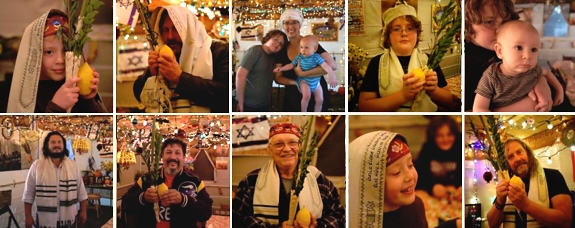 |
Left-to-right (top): 1. Judah holds lulav; 2. John recites the blessing; 2. Olga with Josiah and Emanuel;
4. Josiah waves lulav; 5. Josiah and Emanuel
(bottom): 1. Peter in the sukkah; 2. neighbor (ushpiz); 3. another neighbor (ushpiz);
4) Judah enjoys the season; 5) John waves the lulav
Shabbat Shalom and chag Sukkot Sameach, chaverim...
Allusions and Reality...

10.21.16 (Tishri 19, 5777) We walk by faith, not by sight - by hearing the Word of God, heeding what the Spirit of God is saying to the heart... For now we "see through a glass darkly," which literally means "in a riddle" (ἐν αἰνίγματι). A riddle is an analogy given through some resemblance to the truth, though quite often the correspondences are puzzling and obscure. Hence, "seeing through a glass darkly" means perceiving obscurely or imperfectly, looking "through" something else instead of directly apprehending reality. We see only a reflection of reality, and our knowledge in this life is indirect and imperfect. This is contrasted with the "face to face" (פָּנִים אֶל־פָּנִים) vision and clarity given in the world to come, when our knowledge will be clear and distinct, and the truth of God will be fully manifest and no longer hidden. Being "face to face" with reality means being free of the riddles, the analogies, the semblances, etc., which at best adumbrate our way.. Such reflection should make us humble whenever we share our faith. "Now we know in part, but then shall we know in whole" (1 Cor. 13:12). An honest theology must find a place for mystery, for "seeing through a glass darkly," and for the integrity to say, "I just don't know; I don't have all the answers..."
"Maturity consists in the discovery that there comes a critical moment where everything is reversed, after which the point becomes to understand more and more that there is something which cannot be understood.... It is quite literally true that the law is: increasing profundity is understanding more and more that one cannot understand. And there once again comes in 'being like a child,' but raised to the second power." - Kierkegaard (Journals of Kierkegaard)
Since the LORD God is the Infinite One (אֵין סוֹף) whose understanding is without limit (Psalm 147:5), we must use analogies, metaphors, symbols, allusions, parables, poetry, and other linguistic devices to convey spiritual truth and meaning. We compare (συγκρίνω) spiritual things with spiritual (1 Cor. 2:13). Some mystics have said the way to God is through the transcendence of words altogether (i.e., silence), though most use imagery and poetry about "ineffable" reality. Others, like Soren Kierkegaard, use "indirect communication" to evoke the decision to believe, to find hope, and to walk by faith. Yeshua himself regularly used parables and stories to communicate deeper truths about ultimate reality. He likened the human heart to "soil" into which the Heavenly Farmer plants seed; he wanted his followers to know God as "heavenly Father," the idealization of family love, and so on. Often he was surprised at how dull his own disciples were regarding his use of spiritual analogies (Matt. 15:16, 16:9-11; Mark 8:17; John 6:22-66). Furthermore Yeshua often taught in parables because they simultaneously conceal and reveal the truth. A parable obscures the truth to those who don't really want it; just as it reveals the truth to those who do (Luke 8:9-10). Since Yeshua's whole life was a parable of sorts - a "disguise" that led to the victory of our deliverance (Phil. 2:7) - it is not surprising that he regularly used "figures of speech" to provoke people to examine their own heart attitude and faith... In this connection note that Yeshua never explained the "mysteries of the kingdom of God" directly to the crowds, nor did He ever pander to the crowd's clamor or interests. His message is always meant for the individual soul who was willing to follow Him -- to the one who had "ears to hear." Yeshua will forever be the Face of God to us, our Mediator and Savior, blessed be He (2 Cor. 3:18).
Just as there are hundreds of Names of God given in Scripture, so there are many analogies to help us understand His heart. For instance, God is likened to a farmer, a shepherd, a caring neighbor, a tenant, a king, an impartial judge, a pottery maker, an investor, an employer, a jilted husband, a passionate lover, and so on. However, the analogy Yeshua used the most was that the LORD God is our Heavenly Father, and we are His children. As it is written in the Psalms, "Like a father pities his children, so the LORD pities those who fear Him" (Psalm 103:13). The most intimate Name of God is simply Abba (אבּא), a term of endearment for a child uses for his father. For those who can believe, the eyes of the LORD are like those of a loving father who greatly rejoices over the presence of his child.
Ultimate Concerns...

10.21.16 (Tishri 19, 5777) The Torah portion repeatedly warns us not to worship an idol or to make a graven image (לא־תַעֲשֶׂה־לְךָ פֶסֶל). Literally this refers to the ancient practice of bowing before "mediating forces" of God, often symbolized by art and ritual, as a token of respect or as a means of finding "acceptance" within a group. We are not to imitate such customs of the pagan world around us; on the contrary, we testify of the One True God and repudiate the need for intermediaries between God and man... On a different level, "bowing before an idol" means passively yielding to the world and its ideals rather than submitting to the truth. When we seek to fit in, to feel like we belong, and follow the trends and passions of the crowd, we express idolatry of heart. Most intimately, an idol is a source of desire, happiness, and security apart from the LORD. Your "god" is whatever your heart admires, follows and loves... If you have "other gods" before the LORD, then something is wrong, since we were created by God to find life in Him alone. "Surely you don't think the Scripture speaks vainly when it says: the spirit which He sent to live in us wants us for himself alone?" (James 4:5) "Grace will save a man... but it will not save him and his idol" (A.W. Tozer). Therefore, my dear friends, flee from idolatry (1 Cor. 10:14).
The purpose or "goal" of life is to learn to be loved by God, to accept our place within his heart, and to "live, move, and have our being" rightly related to Divine Truth revealed in Messiah. The first lesson, then, is to know who we are and how much we are loved. Learning this is often a struggle, however. We are easily distracted. We forget why we are here. Because of this we must constantly remind ourselves of our true identity, of our high calling, and the reason for our lives... Much of our trouble comes from "disordered love," by elevating what is finite to the status of the infinite. Indeed idolatry is the substitution of not-god (לא־אֵל) for the sacred, absolutizing the present and worshiping the temporal. We find lasting inner peace only after we surrender to God's will for our lives...
Often we are slow to realize our desperate need and God therefore allows us to revisit the various "waste places" of our own lusts until we have become sick of ourselves -- sick "to the bones." We have to be willing "to give up our sickness." Usually that means that we must experience repeated failures until we have "learned from the heart" that the LORD alone is our Healer and Deliverer (2 Cor. 7:10). Ironically it is only after we have abandoned teshuvah in our strength that we are enabled to truly turn.
God knows that we are unable to overcome our inner corruption - that we are unable to help ourselves - apart from his miraculous intervention, and therefore he creates a new heart and puts a new spirit within us (Ezek. 36:26). In this way the Lord makes us direct witnesses of his transforming power and glory... Our changed lives are made testimonies sent out to impart hope, to raise the dead of heart, and to bind up the bruised of spirit.
People are "hard-wired" to value and desire what they esteem as good. It's not a question of whether we worship, but what... What is your ultimate concern? What are you looking to for life?
One Day at a time...
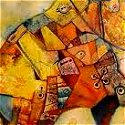
10.21.16 (Tishri 19, 5777) Instead of inwardly chafing over the tests and struggles we face in this life, we might look for reasons to be grateful, for how else can we come to know that the Lord is with us apart from his ongoing deliverance? We ask the Lord for our daily bread (לֶחֶם חֻקֵּנוּ), but I wonder if we are not starving ourselves with fear of the future... Daily bread cannot be stored or hoarded lest it become spoiled and rotten (Exod. 16:20). We must live today in complete trust before the Lord our God, who is forever faithful and true. He it is who said, "Don't be anxious about tomorrow, for tomorrow has its own troubles. Live one day at a time" (Matt. 6:34). It makes no sense to worry about the future if the LORD is the Good Shepherd who tenderly watches over your way (Psalm 23:1).
Trust from the Heart...

10.20.16 (Tishri 18, 5777) "Trust in the LORD with all your heart, and do not rely on your own understanding" (Prov. 3:5). Note the contrast between trusting and understanding in this familiar verse. Trust is a matter of heart, the decision to let go, whereas understanding is analytical, "objective," a matter of physical seeing. Human reason may help you discern the "what" of faith, but it is powerless to waken the soul, to breath life into heart, and to impart passion to seek God's Presence as your greatest need and your utmost good.
בְּטַח אֶל־יְהוָה בְּכָל־לִבֶּךָ
וְאֶל־בִּינָתְךָ אַל־תִּשָּׁעֵן
be·tach · el · Adonai · be·khol · lib·be·kha
ve·el · bi·na·te·kha · al · tish·sha·ein

"Trust in the LORD with all your heart
and do not rely on your own understanding"
(Prov. 3:5)

Hebrew Study Card
Most commandments do not test how we comprehend our faith as much as they test the surrender of our heart. The test of faith requires bittachon (בִּטָּחוֹן) - that is, abandoning our need to understand so that we can completely cling to God's wisdom...
"Fear not, for I am with you..." אַל־תִּירָא כִּי עִמְּךָ־אָנִי. What we need most of all is right here, present in this hour, whether we're conscious of it or not. God is with you, even if you feel alone, lost in darkness, unclean, afraid... "Dear Lord Jesus, I don't know who I am, I don't know where I am, and I don't know what I am, but please love me" (prayer of a sufferer from Alzheimer's disease). That's what we need most, to trust that we are safe in God's love, and that's the ultimate message of our atonement in Messiah.
Yeshua the Hidden Guest...
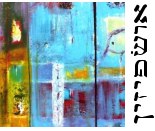
[ The following is related to the holiday of Sukkot, or the Feast of Tabernacles... ]
10.19.16 (Tishri 17, 5777) The Aramaic word "ushpizin" (אוּשְׁפִּיזִין) refers to the seven "guests" whom we remember and honor during the weeklong festival of Sukkot, namely: Abraham, Isaac, Jacob, Joseph, Moses, Aaron, and King David, respectively. According to Jewish tradition, on each night a different guest (i.e., ushpiz: אוּשְׁפִּיז) enters the sukkah, and we are to symbolically welcome them by offering them a place at our table (this is similar to the tradition of Elijah's Cup during Passover). On the first night comes Abraham; on the second, Isaac, and so on. In the Gospel of John we read that Yeshua said he go up to the Feast of Tabernacles "in secret" (ἐν κρυπτῷ), like an ushpiz (John 7:10). During the "middle of the festival," perhaps on the fourth day (the "Day of Joseph"), Yeshua went to the Temple and began teaching the people (John 7:14), and on the last great day, called Hoshana Rabbah, when the High Priest led a parade to the pool of Siloam during the water libation ritual, Yeshua stood up and cried out, "If anyone thirsts, let him come to me and drink" (John 7:38). Finally, on the morning following the festival, called Shemini Atzeret, Yeshua returned to the Temple and said, "I am the light of the world. Whoever follows me will not walk in darkness, but will have the light of life" (John 8:12), recalling the words of the prophet: "On that day there shall be no light... and living waters shall flow out of Jerusalem; And the LORD will be king over all the earth. On that day the LORD will be one and his name one" (Zech. 14:6,9; Isa. 13:10; 30:26).
Note: For more on this see, "The Seven Ushpizin: Yeshua as the Hidden Guest."
Sukkot and Vanity...
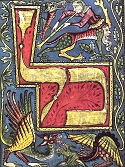
10.18.16 (Tishri 16, 5777) The Book of Ecclesiastes (megillat Kohelet) is traditionally read during the festive holiday of Sukkot, though you might be surprised to learn that many of the early sages did not want it included as part of the Jewish Scriptures. After all, the philosophy of Kohelet - that we are incapable of fully understanding the purposes of the world, and therefore much of what we think is important is really havel havalim (הֲבֵל הֲבָלִים), "vanity of vanities" - is contrary to a theology of reward and punishment found in the writings of Moses. This question is not unlike the Book of Job and the mysterious question as to why the righteous suffer... It is to their credit that the sages finally decided to include the scroll as part of the accepted canon, however, since it takes great humility to admit that we must continue to seek God, despite uncertainty and transience of this world.
Indeed, we read Ecclesiastes to remind us that lasting meaning and purpose is not found in life lived "under the sun" but rather in knowing and serving God. Solomon therefore concludes his existential reflection as follows: "Fear God and keep his commandments: ki zeh kol-ha'adam (כִּי־זֶה כָּל־הָאָדָם), "for this is the whole man" (Eccl. 12:13), which suggests that those who revere the LORD and obey His Word will be healed of despair and inner vanity...
סוֹף דָּבָר הַכּל נִשְׁמָע אֶת־הָאֱלהִים יְרָא
וְאֶת־מִצְוֹתָיו שְׁמוֹר כִּי־זֶה כָּל־הָאָדָם
sof · da·var · ha·kol · nish·ma · et · ha-E·lo·him · yir·a
ve·et · mitz·vo·tav · she·mor · ki · zeh · kol · ha·a·dam

"Let us hear the conclusion of the whole matter: Fear God
and keep his commandments: for this is the whole man."
(Eccl. 12:13)

Download Study Card
"The grass withers, the flower fades, but the word of our God will stand forever" (Isa. 40:8). Note the great contrast between olam ha-zeh and olam haba – between this present world and the heavenly realm.... Unlike the grass of the field that dries up or flowers that soon fade, the word of God stands forever. And despite the frailty of man and the inevitability of physical death, God's truth endures, which is a foundation upon which we can rest.
Note: For more on this topic, see: "Sukkot and Vanity..."
Sukkah of the Heart...

[ The following is related to the holiday of Sukkot, the "Feast of Tabernacles." Chag Sameach! ]
10.18.16 (Tishri 16, 5777) The word sukkot (סֻכּוֹת) is the plural of the Hebrew word sukkah (סֻכָּה), meaning a "booth" or "hut." In traditional Judaism, a sukkah is a temporary structure used for "living in" (i.e., primarily eating meals or entertaining guests) throughout the week-long holiday. The purpose of the sukkah is to remind us of how God tenderly cared for the Israelites as they made their trek through the dangers of the desert. God spoke endearingly to Israel: "Follow me into the wilderness, into an unsown land" (Jer. 2:2).
The Scriptures state, "The LORD upholds all who are falling and raises up all who are bowed down" (Psalm 145:14). It has been said that the word sukkah can be understood as an acronym formed from the words somekh Adonai (סוֹמֵךְ יְהוָה), "the LORD upholds," kol (כָּל), "all," and ha'noflim (הַנּפְלִים), "the ones who fall." This suggests that those who make a sanctuary within their hearts, trusting in God's indwelling Presence, will be upheld and kept from falling (Jude 1:24). God knows I need this truth to be made real in this hour...
סוֹמֵךְ יְהוָה לְכָל־הַנּפְלִים
וְזוֹקֵף לְכָל־הַכְּפוּפִים
so·mekh · Adonai · le·khol · ha·no·fe·lim
ve·zo·kef · le·khol · ha·ke·fu·fim

"The LORD upholds all who are falling
and raises up all who are bowed down"
(Psalm 145:14)

Hebrew Study Card
The Kotzer Rebbe said that the verse, "this is my God, and I will praise him, my father's God, and I will exalt him" (Exod. 15:2), may be understood as, "this is my God, and I will make a dwelling for Him within me." Though the LORD is forever enthroned in heaven as our Creator, King, and Deliverer, we still must make a dwelling within us. He stands at the door and knocks. "Where does God dwell," it is asked, "but where He is given a dwelling place, a sanctuary, a throne within the heart?"
Dwelling in the Presence...
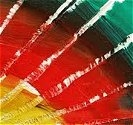
[ The following is related to the holiday of Sukkot, the "Feast of Tabernacles." ]
10.18.16 (Tishri 16, 5777) During the holiday of Sukkot we construct a sukkah, a "booth" or temporary structure, that we will "live in" for the holiday week. Among other things, living in a sukkah is meant to recall God's surrounding love and care for us as we make our journey through the desert of this world on our way to Zion... It is an attempt to make visible the invisible, to catch a glimpse of God's abiding glory. On a spiritual level, however, the essence of Sukkot is "dwelling" or "abiding" in the Divine Presence. And though the LORD is forever enthroned in heaven as our Creator, our King, and our loving Deliverer, and though indeed the whole earth is filled with His glory (Isa. 6:3), nevertheless we must make a dwelling within our hearts. He stands at the door and knocks (Rev. 3:20). "Where does God dwell," it is asked, "but where He is given a place, a sanctuary, a throne within the heart."
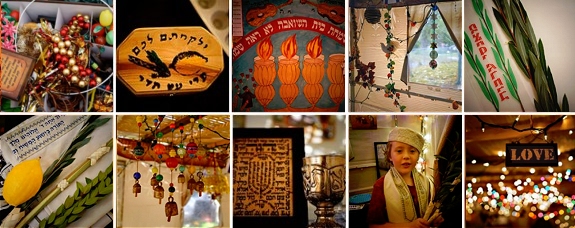 |
Left-to-right (top): 1. Sukkah decorations; 2. wooden etrog case; 2. Sukkah poster;
4. sukkah wall hangings; 5. aravot (willow branches)
(bottom): 1. our lulav with etrog; 2. chimes from the roof; 3. kiddush cup;
4) Judah with lulav; 5) love is the meaning of Sukkot
Left-to-right (top): 1. John and family; 2. Judah helps build the sukkah; 2. a view from the top;
4. festive gathering; 5. Olga lights the yom tov candles
(bottom): 1. Emanuel David's first Sukkot; 2. Irina and Vadim; 3. John rejoices in the sukkah;
4) Josiah recites netilat lulav; 5) Judah ready to wave lulav
 |
There are two great questions God always is asking us. The first is "who do you say that I am?" and the second is "will you make a place for me?" Being in a love relationship with God is the goal of life, the "end of the law," and the reason we were created. But we cannot love God apart from understanding his passion for us. The LORD is the "Jealous God," a Consuming Fire, the One who desires all of our heart on the altar (Luke 9:23). Therefore the very first commandment is simply אָנכִי יְהוָה אֱלהֶיךָ, "I AM the LORD your God" (Exod. 20:2), because without "making a place" God's love within your heart, nothing else will follow.
Note: To see some larger pictures of our Sukkot celebrations, click here.
Surrounded by His Sukkah...

[ The following is related to the holiday of Sukkot, or the Feast of Tabernacles... ]
10.17.16 (Tishri 15, 5777) The root idea of the word "sukkah" means to cover or surround, as in hedge of protection. The Hebrew root is used when Moses asked to behold God's glory and the meaning of the name YHVH (יהוה), and God said, "Behold there is a place by me where you shall stand on the rock, and while my glory overtakes you I will cover you with my hand (וְשַׂכּתִי כַפִּי עָלֶיךָ) until I have passed by (Exod. 33:21-21). The hand of God (יַד־יְהוָה) is our sukkah, and indeed the LORD writes our names upon his palms and sets us as a seal upon his heart (Isa. 49:16; Sol. 8:6). Likewise David affirmed that God would treasure you within his sukkah and elevate you upon the Rock that is Messiah:
כִּי יִצְפְּנֵנִי בְּסֻכּה
בְּיוֹם רָעָה יַסְתִּרֵנִי בְּסֵתֶר אָהֳלוֹ
בְּצוּר יְרוֹמְמֵנִי
ki · yitz·pe·nei·ni · be·suk·koh
be·yom · ra·ah · yas·ti·rei·ni · be·se·ter · a·ho·lo
be·tzur · ye·ro·me·mei·ni

"For he will hide me in his sukkah
in the day of trouble he will conceal me in the secret place of his tent;
on the Rock he will raise me up"
(Psalm 27:5)
The LORD will "treasure you" (the word tzafan [צָפַן] often is translated as "to hide") in his sukkah, a symbol of his protection of your soul... in the day of trouble he will conceal you in his tent, that is, within his dwelling place, under the shadow of his wings he makes you refuge; he will elevate you upon the Rock which is Messiah (1 Cor. 10:4).
Since God's Name (יהוה) means "Presence," "Breath," "Compassion," "Love," "Healing," and so on, we are surrounded by his Sukkah at all times... In other words, you don't have to be in a physical sukkah to be in His sukkah! May God open our eyes to see his glory!
Sukkot Sameach be'Yeshua (סוכות שמחה בישוע) - Happy Sukkot in Yeshua!
Sukkot and Salvation...
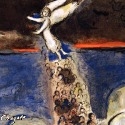
[ The holiday of Sukkot ("the Feast of Tabernacles") begins tonight at sundown... ]
10.16.16 (Tishri 14, 5777) The holiday of Sukkot remembers the journey of the redeemed people of God - first from Egypt, then to Sinai, and then into the void of the desert places.... The repeated failures of the Israelites in the wilderness was meant to reveal the insufficiency of "Egyptian thinking" by demonstrating God's faithful love and ongoing care. The entire ordeal in the wilderness was a "Sukkot experience" that pointed beyond Sinai....
The holiday of Sukkot symbolizes the journey of this life by means of erecting a sukkah - a flimsy shelter that we are to "live in" for seven days. The sukkah is meant to help us ask ourselves: Where is the true home we seek? Where is the true shelter of our lives? The first Jew (Abram) was called ha-ivri (הָעִבְרִי) - "the Hebrew," a term that means "one who has crossed over" (עָבַר) from another place. When he heeded the call Lekh lekha (לך־לך), "go for yourself," it was Abram's walk of faith that made him into a Jew.... He left the comforts of Ur to become a tent dweller who became a "stranger and sojourner" with God. Similarly, the Jewish people as a whole were forced to leave the "security" of Egypt and journey into the unknown in order to realize the promises of God. Sukkot ultimately reminds us that our security is neither found in political power structures nor in the concrete walls of our homes, but solely in the Presence of God. Our freedom as God's children is at stake in the matter of redemption, and God takes it very seriously when we seek to exchange any supposed source of security for the venture of true faith....
So where is the true home you seek? Are you clinging to hope in this world and its counterfeit security? Are you willing to sacrifice your dignity as a child of God for the protection of the "State"? When God redeemed Israel from Egypt, it was a rebirth experience. Passover represented the means of redemption (the blood of the lamb), Shavuot represented the revelation of the holiness of God (the Sinai experience), and Sukkot represented the walk of faith as reborn and redeemed children. God took Israel out of Egypt (i.e., out of the world) in order to reveal to them who He is -- and who they were in relationship with Him.... The pattern remains the same. The world system is a form of slavery, and Sukkot reveals how God bypasses the world to care for His people...
For more on this topic, see "Sukkot and Freedom." Chag Sukkot Sameach friends!
Strangers to this World...

[ The following is related to the holiday of Sukkot, or the Feast of Tabernacles... ]
10.16.16 (Tishri 14, 5777) God's people are "strangers" in this world; they are estranged and live as "resident aliens" -- here, yet not here.... Thus Abraham said to the sons of Chet: "I am a 'stranger and sojourner' (גֵּר־וְתוֹשָׁב) among you; sell me a burial site..." (Gen. 23:4), and likewise King David confessed: "For we are strangers with You (כִּי־גֵרִים אֲנַחְנוּ לְפָנֶיךָ) and sojourners like our fathers; our days on earth are like a shadow (כַּצֵּל יָמֵינוּ) without abiding (1 Chron. 29:15). Faith affirms that underlying the surface appearance of life is a deeper reality that is ultimately real and abiding. It "sees what is invisible" (2 Cor. 4:18) and understands (i.e., accepts) that the "present form of this world is passing away" (1 Cor. 7:31). The life of faith therefore calls us to live as toshavim - sojourners - who are at an infinite "distance" from the world of appearances and who seek the Eternal. The holiday of Sukkot reminds us that we are just passing through this world, as we look forward to our real home in heaven (Heb. 11:9-10). "O You who are at home deep within my heart, enable me to join you deep in my heart."
Torah First and Last...

[ We read the last -- and first -- portion of Torah during the season of Sukkot.... ]
10.16.16 (Tishri 14, 5777) Our Torah reading for this week is a bit complicated. In addition to the passages we read for the holiday of Sukkot, we will also read the Book of Ecclesiastes (i.e., Kohelet) for the Sabbath of Sukkot. We will also read both the last portion of the Torah (i.e., V'zot HaBerakhah: Deut. 33:1-34:12) as well as the first chapter of the Torah (i.e., Gen. 1:1-2:3) for the holiday of "Simchat Torah" (which immediately follows Sukkot). Finally, on the Sabbath that follows the celebration of Simchat Torah, we will read the entire portion of Bereshit (i.e., Gen. 1:1-6:8). The upshot is that during this season of the year we will read the end of the Torah scroll and then "rewind" it to the beginning...
Every year we read the Torah from beginning to end... We do this every year because Talmud Torah - the study of Torah - is an ongoing venture in the life of a Jew. In this connection, it is interesting to note that the very first letter of the Torah is the Bet (בּ) in the word bereshit (בְּרֵאשִׁית), and the very last letter of the Torah is the Lamed (ל) in the word Israel (יִשְׂרָאֵל). Putting these letters together we get the word lev (לֵב), "heart," (note the similarity to the English word "love") suggesting that the entire Torah - from the first letter to the last - reveals the heart and love of God for us... Moreover, the first letter of Scripture is a Bet (בּ), as explained above, and the last letter is a Nun (ן) in the word "Amen" (אָמֵן), so the whole Bible - from beginning to end - reveals the Person of God the Son (בֶּן) for us...
Note: For more on this subject, see "Every Letter of Torah."
Choosing to Rejoice...
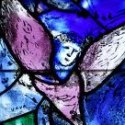
[ The holiday of Sukkot ("Tabernacles") begins Sunday, Oct. 16th at sundown this year... ]
10.14.16 (Tishri 12, 5777) The Torah describes Sukkot ("Tabernacles") as a holiday of joy and gladness: "You are to rejoice in your festival.... for seven days you shall keep the festival... so that you will be altogether joyful" (Deut. 16:14-15). Nevertheless we may wonder how we can celebrate in a world filled with suffering, death, and misery? Since God commands us to be joyful, however, we must therefore understand joy to be something more than temporal elation or fleeting pleasure, but rather as the result of the decision to believe in healing and life despite the appearances of this realm. "The world to come, the perfect world, we at least believe in; but this material world, this one here and now, how can anyone believe in it? The only thing to do is to run to the refuge of God" (Nachman). The joy of Sukkot, then, is the joy of hope, the conviction that "all shall be well, and all manner of thing shall be well." Darkness will be overcome by the light; evil will become undone; all that is untrue shall be made true; and every tear shall be wiped away... The sukkah symbolizes the "Clouds of Glory" that surround our way in the desert – the "Divine Presence" beheld in faith. We find joy as we choose to believe in the deeper reality of God's sheltering love...
The Holiday of Sukkot (Tabernacles)

[ The week-long holiday of Sukkot begins Sunday, Oct. 16th at sundown this year... ]
10.14.16 (Tishri 12, 5777) On the Jewish calendar, there is a quick transition from the somber time of the Jewish High Holidays (Rosh Hashanah through Yom Kippur) to the week-long festival of Sukkot (called "Tabernacles" in the Christian tradition). If the High Holidays focus on the LORD as our Creator, our Judge, and the One who atones for our sins, then Sukkot is the time when we joyously celebrate all that He has done for us. Prophetically understood, the seven days of Sukkot picture olam haba, the world to come, and the Millennial Kingdom reign of Mashiach ben David. If Yeshua was born during Sukkot (i.e., conceived during Chanukah, the festival of lights), then another meaning of the "word became flesh and 'tabernacled with us" (John 1:14) extends to the coming kingdom age, when He will again "sukkah" with his people during the time of his reign from Zion.
Since it represents the time of ingathering of the harvest, Sukkot prophetically prefigures the joyous redemption and gathering of the Jewish people during the days of the Messiah's reign on earth (Isa. 27:12-13; Jer. 23:7-8). Indeed all of the nations that survived the Great Tribulation will come together to worship the LORD in Jerusalem during the Feast of Sukkot (Zech. 14:16-17). The holiday season therefore provides a vision of the coming Kingdom of God upon the earth, when the Word will again "tabernacle with us."
 |
This year Sukkot begins just after sundown on Sunday, Oct. 16th (i.e., Tishri 15 on the Jewish calendar). The festival is celebrated for seven days (i.e., from Tishri 15-21) during which we "dwell" in a sukkah -- a hut of temporary construction, with a roof covering (schach) of raw vegetable matter (i.e., branches, bamboo, etc.). The sukkah represents our dependence upon God's shelter for our protection and divine providence. We eat our meals in the sukkah and recite a special blessing (leshev Ba-Sukkah) at this time.
The Lulav Bouquet...
In addition to the Sukkah, the most prominent symbol of Sukkot is the Arba'at Ha-minim (אַרְבַּעַת הַמִּינִים) - "the Four Species," or four kinds of plants explicitly mentioned in the Torah regarding the festival of Sukkot: "On the first day you shall take: 1) the product of goodly trees (etrog), 2) branches of palm trees (lulav), 3) boughs of leafy trees (hadas), and 4) willows of the brook (aravot), and you shall rejoice before the LORD your God for seven days" (Lev. 23:40). We wave the "four species" (held together as a bouquet with the etrog) and recite a blessing (netilat lulav) to ask God for a fruitful and blessed year.
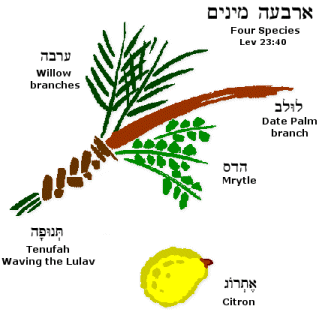 |
Sukkot marks the conclusion of the Jewish Fall Holidays and is the last of the three Shelosh Regalim (שלוש רגלים, i.e., the three annual pilgrimage festivals: Pesach (Passover), Shavuot (Pentecost), and Sukkot (Tabernacles) (Deut. 16:16). It can be argued that Sukkot is the climax of all the festivals in Scripture: Everything leads to it as a culmination in God's prophetic plan. It is interesting to compare the use of words relating to simchah [joy] in the description of these three festivals. Regarding Pesach, the word simchah does not appear at all (Deut. 17:1-8); regarding Shavuot, it appears only once (Deut. 17:11); but, regarding Sukkot, simchah appears several times. For instance:
You shall keep the Feast of Sukkot seven days, when you have gathered in the produce... You shall rejoice in your feast (וְשָׂמַחְתָּ בְּחַגֶּךָ אַתָּה)... because the LORD your God will bless you in all your produce and in all the work of your hands, so that you will be altogether joyful. (Deut. 16:13-15)
Sukkot is called "z'man simchateinu," the "season of our joy." Indeed, in ancient Israel, the joy of Sukkot was so renowed that it came to be called simply "the Feast" (1 Kings 12:32). Sukkot was a time when sacrifices were offered for the healing of the nations (Num. 29:12-40), and it was also a time when (on Sabbatical years) the Torah would be read publicly to all the people (Deut. 31:10-13).
From a spiritual perspective, Sukkot corresponds to the joy of knowing your sins were forgiven (during Yom Kippur) and also recalls God's miraculous provision and care after the deliverance from bondage in Egypt (Lev. 23:43). Prophetically, Sukkot anticipates the coming kingdom of the Messiah Yeshua wherein all the nations shall come up to Jerusalem to worship the LORD during the festival (see Zech. 14:16). Today Sukkot is a time to remember God's Sheltering Presence and Provision for us for the start of the New Year.
Note: The weekly Torah readings are suspended for the week of Sukkot, though we will finish reading the Torah (and begin reading it anew) on the holiday of Simchat Torah, immediately following the holiday. For more information about Sukkot, including how you can observe it as a follower of Yeshua, see the Sukkot pages and their links.
Faith Comes from Hearing...

[ Our Torah portion for this week (Ha'azinu) is always read during the High Holidays... ]
10.13.16 (Tishri 11, 5777) Every year just after the solemn time of Yom Kippur we read parashat Ha'azinu, the great prophetic song that Moses was commanded to teach the Jewish people before he died. Ha'azinu reminds us that who we listen to ultimately decides our fate. It begins, הַאֲזִינוּ הַשָּׁמַיִם וַאֲדַבֵּרָה - "Give ear, O heavens, and I will speak" (Deut. 32:1). The song is didactic, intended to teach us something. It begins quietly: "like gentle rain upon the tender grass, and like showers upon the herb...." The Spirit here appeals to the humble to drink in the message given from above. Heed first the kol demamah dakkah, the "still small voice" (קוֹל דְּמָמָה דַקָּה) and receive the proclamation of the Name of the LORD and His greatness (Deut. 32:3, also Exod. 34:6-7). Understand His attributes (middot): the LORD is the Rock (הַצּוּר), his deeds are perfect, and all His ways are just. He is the Faithful God (אֵל אֱמוּנָה), without iniquity, forever true and upright (צַדִּיק וְיָשָׁר הוּא) (Deut. 32:3-4).
The world has its message or its "song," chaverim, which is invariably focused on fear, anger, and self-preservation. We are tempted, are we not, to listen and accept such propaganda without serious reflection.... After all, we are always listening to someone, but the all-important question is to whom? The inner voice of your soul gets its messages from somewhere. Tragically, many of our opinions are formed by heeding to the "voice of the world," i.e., the crowd, the songs and movies of pop culture, and especially the propaganda (i.e., mainstream "news") that is designed to manipulate and enslave the masses...
So who are you listening to? The Midrash Rabbah says that the ear (אזֶן) gives life to all the organs of the body. How so? By listening (שׁמע, shema) to the Torah. This idea is repeated in the New Testament: "Faith comes from listening to the Word of God" (Rom. 10:17). The Word of God (דְּבַר־אֱלהִים) is our very life, chaverim. Listening to other voices (regardless of how seemingly well-intended) means cutting yourself off from the Source of life itself.... Hearing and obeying are linked, and "hearing" the messages of this corrupt world can eventually make you into an enemy of God Himself (James 4:4). The world always speaks its message to members of its "crooked and twisted generation" (Deut. 32:5). How else do politicians gain their audiences?
For more on this subject, see the article: "You're always listening to someone..."
Blood Over the Tablets...
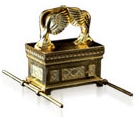
[ The following concerns Yom Kippur, or the "Day of Atonement..." ]
10.13.16 (Tishri 11, 5777) The earthy Tabernacle and its furnishings were "copies" of the heavenly Temple and the Throne of God Himself. Moses was commanded to make the Sanctuary according to the "pattern" revealed at Sinai (Exod. 25:9). "For Messiah has entered, not into holy places made with hands, which are representations (ἀντίτυπος) of the true things, but into heaven itself, now to appear in the presence of God on our behalf" (Heb. 9:24). The centermost point of the earthly Temple was the Ark of the Covenant (אֲרוֹן־הַקּדֶשׁ), a "three-in-one" box that contained God's Holy Word (i.e., the tablets of the Torah). As such, the Ark served as a symbol of kisei ha-kavod (כִּסֵּא הַכָּבוֹד), the Throne of Glory. The Ark stood entirely apart as the only furnishing placed in the "three-in-one" space called the Holy of Holies (קדֶשׁ הַקֳּדָשִׁים). Upon the cover of the Ark (i.e., the kapporet) were fashioned two cherubim (i.e., angel-like figures) that faced one another (Exod. 25:17-18). According to the Talmud (Succah 5b), each cherub had the face of a child - one boy and one girl - and their wings spread heavenward as their eyes gazed upon the cover (Exod. 25:20). This was the sacred place where the blood of purification was sprinkled during Yom Kippur, the Day of Atonement, and this is the Place (הַמָּקוֹם) that prefigured the offering of the blood of the Messiah, our eternal Mediator of the New Covenant. "For I will appear in the cloud over the kapporet" (Lev. 16:2; Exod. 25:22). As it is written, "I have blotted out your transgressions like a thick cloud and your sins like heavy mist; return to me (שׁוּבָה אֵלַי), for I have redeemed you (Isa. 44:22).
The central image of the Tabernacle is that of the Law covered with sacrificial blood - the Place where "Love and truth meet, where righteousness and peace kiss" (Psalm 85:10). It was from the midst of the surrounding cloud that the Voice of the LORD was heard:
חֶסֶד־וֶאֱמֶת נִפְגָּשׁוּ
צֶדֶק וְשָׁלוֹם נָשָׁקוּ
che·sed ve·e·met nif·ga·shu
tzedek ve·sha·lom na·sha·ku

"Love and truth have met,
justice and peace have kissed."
(Psalm 85:10)

Download Study Card
Atonement and Healing...

10.13.16 (Tishri 11, 5777) Atonement is about righting the wrong that separates us from God, repairing the breach caused by our sin, and being healed from the curse of death. We all desperately need this healing, yet our own hearts are the source of the trouble (Matt. 15:19-20). The holiness and justice of God (אלהִים) requires that sin be punished by death, but God is also merciful and gracious (יהוה), and therefore He instituted a system of animal sacrifices and blood rituals to provisionally "atone" for sin (i.e., restore the broken relationship with God). Since the life of the flesh is in the blood (Lev. 17:11), and the penalty for sin is death, the shedding of blood represents atonement (כַּפָּרָה) for sin. With regard to the chatat ("sin offering") or asham ("guilt offering"), a person would bring a kosher animal (korban) to the entrance of the Tabernacle and place both hands on the animal's head to identify with it (Lev. 4:29). This act of "semikhah" (סְמִיכָה) symbolically (i.e., ritually) transferred the penalty of sin and guilt to the sacrificial animal. Then, the person would slay the animal and confess that his sin caused the innocent to be slain in his place (Menachot 110a). The elaborate sacrificial system was intended to depict this "life-for-life" principle: God accepted the blood of a sacrifice in exchange for the life of the sinner...
The sacrificial system of the Tabernacle was a temporary arrangement until the coming of Messiah, the Promised Deliverer (Gal. 3:24-25; Rom. 10:4; Heb. 9:1-12). The redemption obtained by animal sacrifices was merely provisional and symbolic, "for it is impossible for the blood of bulls and goats to take away sins" (Heb. 10:4). For eternal remedy, for the spiritual life of the soul, something far greater was needed, namely, the sacrifice of God Himself. Consequently, when Yeshua came into the world, he said, "Sacrifices and offerings you have not desired, but a body have you prepared for me," and "'Behold, I have come to do your will, O God, as it is written of me in the scroll of the book" (Heb. 10:5,7). All this is profoundly mysterious, of course. After all, if the Kohen Gadol (High Priest) could enter the Holy of Holies only once a year to present sacrificial blood upon the kapporet, invoking the Divine Name YHVH, and interceding for God's mercy on behalf of the people, how much more mysterious is Messiah's intercession for us as he willingly shed his own blood and died in exchange for the curse of our sins (Gal. 3:13)? It was there - in the true Holy of Holies, the "greater and more perfect tabernacle not made with hands" (Heb. 9:11), where the blood of Yeshua was poured out to pay the penalty for our sins, and it was there that we are given eternal life and healing (2 Cor. 5:21). Yeshua is the true Temple of God and the Central Sacrifice of God given on our behalf. In ways we simply cannot fathom, the sacrificial death of Yeshua redeems us from the curse of death and makes us alive together with God. We draw near to God through Him alone; he alone is the true High Priest of God, the One who finishes the work of redemption on our behalf in the Temple of his body...
The New Testament teaches that Yeshua came to die "for our sins," to heal us from the plague of death (Heb. 7:27, 9:26; 1 John 3:5). Our sin separates us from God, but Messiah's sacrifice draws us near (Heb. 7:19). The message of the gospel is that the Voice of the LORD - the very Word spoken from between the cherubim above the kapporet (mercy seat) - "became flesh" (ὁ λόγος σὰρξ ἐγένετο) and "tabernacled among us" (ἐσκήνωσεν ἐν ἡμῖν) for the purpose of becoming our substitutionary sacrifice for the guilt and defilement caused by our sins (John 1:1,14). Yeshua was "born to die" (Heb. 10:5-7), and his life was lived in relation to His sacrificial death (Mark 8:27-33). As the Apostle Paul put it: This is of "first importance": Yeshua was born to die for our sins, to make us right with God, and was raised from the dead to vindicate the righteousness of God (1 Cor. 15:3-4). His sacrificial death eternally draws us near to God, and we can come boldly before God's Presence on the basis of His shed blood for our sins...
At the risk of repeating myself, let me once again remind you that the sacrificial system of Torah functions as a parable for us, or a metaphor of God's great redemptive plan revealed in the life and death of Yeshua. The Mercy Seat (kapporet) represents both the Throne of God (Heb. 4:16; 2 Kings 19:15) as well as the cross of Yeshua, where propitiation for our sins was made (Rom. 3:25). The glory of the Torah of Moses was destined to fade away (2 Cor. 3:3-11), just as its ritual center (i.e., the Tabernacle/Temple) was a shadow (σκιά) to be replaced by the greater priesthood of Malki-Tzedek (Heb. 10:1; 13:10). Yeshua is the Goal and the "Goel" (i.e., גּאֵל, Redeemer) from the curse of the law (Gal. 3:13). "For the law made nothing perfect, but on the other hand, a better hope is introduced, and that is how we draw near (karov) to God" (Heb. 7:19). The sacrificial death of Yeshua caused the parochet of the Temple to be torn asunder, revealing that access to the Presence of God is now available for all who come to God trusting in the finished work of God's Son.
Why Yom Kippur Matters...

10.12.16 (Tishri 10, 5777) The author of the Book of Hebrews writes, "When the Messiah appeared as Kohen Gadol (high priest) of the good things to come, then, through the greater and more perfect Tabernacle (בַּמִּשְׁכָּן הַגָּדוֹל וְהַשָּׁלֵם) which is not made with human hands (that is, not of this creation), he entered into the Kodesh haKodashim (the Holy of Holies) once and for all - not by means of the blood of goats and calves but by means of his own blood, thus securing for us eternal redemption" (see Heb. 9:11-12). The Levitical system of worship was a shadow of the greater reality to come (צֵל טבוֹת הָעֲתִידוֹת), since "it is impossible (ἀδύνατος) for the blood of bulls and goats to take away (i.e., ἀφαιρέω, used to translate the Hebrew כָּרַת, to "cut off") sins" (Heb. 10:4).
Note further that Hebrews 9:8-9 indicates that the way to the Holy of Holies (i.e., kodesh hakodashim: קדֶשׁ הַקֳּדָשִׁים) was not yet open as long as the "outer tent" still stood (i.e., the Levitical priesthood as the ritualistic expression of the covenant made at Sinai), since that was symbolic of "the present age," or the "dispensation that was passing away" even as the Brit Chadashah (new covenant) was being established (Heb. 8:13). For more on this crucial subject, see "The Parochet Rent in Two."
Yeshua and Yom Kippur...

10.12.16 (Tishri 10, 5777) The elaborate Yom Kippur ritual was established by God to teach us vital truth about our beloved Messiah. Just as both of the goats of the Yom Kippur ritual constituted a single offering made to God (i.e., Lev. 16:5 states "he [Aaron] shall take ... two male goats for a (singular) sin offering"), so the sacrifice of Yeshua represents two aspects of a single offering before God. The blood of the first goat was given "to the LORD" (לַיהוָה) for atonement, but the exile of the second goat was given to banish sins from the Divine Presence (לַעֲזָאזֵל). Likewise Yeshua served as both our atoning sacrifice before the Father and as our "scapegoat" who "carries away our sins" (Isa. 53:4, 5; Matt. 8:17; 1 Pet. 2:24). The "sent away goat" represents the separation from God that Yeshua experienced on our behalf as He bore the wrath of God in our place... Because of the Messiah's sacrifice, our sins are now put away "as far as the east is from the west" and are forever buried in the bottom of the sea, never to be remembered again (Psalm 103:12; Mic. 7:19; Isa. 38:17; Jer. 31:34).
For more on this topic, see "Mystery of the Scapegoat: Further thoughts on Yom Kippur."
Yom Kippur and Joy...
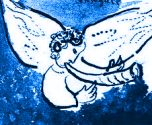
10.12.16 (Tishri 10, 5777) Yom Kippur, or the "Day of Atonement," is a time to celebrate our salvation in Messiah; it is a time to honor the wonder of our atonement, namely, that God has "blotted out the handwriting of ordinances that was against us, which was contrary to us, and took it out of the way, nailing it to his cross" (Col. 2:14). Because of the mesirat nefesh (sacrificial mediation) of Yeshua, the record of debt incurred by our sin has been paid in full. Yom Kippur reminds us that Yeshua "redeemed us from the curse of the Law being made a curse for us" (Gal. 3:13). God publicly displayed Yeshua at his death as the "mercy seat" (i.e., kapporet: כַּפּרֶת) made accessible through faith (Rom. 3:25). The LORD gave up His life so that we can be in relationship with Him, that is, so that we can be "at-one" with His heart for us. Whatever else it may mean, then, the word "atonement" (i.e., kapparah, "covering," "protection," "purification," "forgiveness") is about accepting God's heart for you - being unified in his love - and if you miss that, you've missed the entire point of the High Holiday season. Above all, then, Yom Kippur, is a time to celebrate God's great love for us.
בָּרוּךְ אַתָּה יהוה הַנּוֹתֵן הַכָּפָּרָהּ בְּיֵשׁוּעַ
"Blessed are You, LORD, Giver of the atonement in Yeshua"
Yom Kippur and Divine Mercy...

[ Yom Kippur, or the "Day of Atonement," begins this evening at sunset... ]
10.11.16 (Tishri 9, 5777) I mentioned the other day that there were two revelations of the Name YHVH (יְהוָה) given to Moses. The first revelation occurred when he asked for God's Name while he encountered the burning bush and was commissioned to lead Israel out of Egypt: "If I come to the people of Israel and say to them, 'The God of your fathers has sent me to you,' and they ask me, 'What is his name?' what shall I say to them?" God then replied: ehyeh asher ehyeh (אֶהְיֶה אֲשֶׁר אֶהְיֶה), "I AM WHO I AM." And he said, "Say this to the people of Israel, 'I AM (אֶהְיֶה) has sent me to you'" (Exod. 3:13-14). Apparently Moses did not regard the historical description of God as the "God of Abraham, Isaac, and Jacob" to be sufficient to attest to his mission before the elders of Israel, so he pressed the issue, though the LORD clearly linked His Name with the patriarchs nonetheless: "Say this to the people of Israel, 'The LORD (יְהוָה), the God of your fathers, the God of Abraham, the God of Isaac, and the God of Jacob, has sent me to you.' This is my name forever, and thus I am to be remembered throughout all generations" (Exod. 3:15). It should be noted here that God's initial response, namely, "I AM" (אֶהְיֶה), is the Qal imperfect, first person singular of the verb hayah (הָיָה), "I will be," and therefore is thought to be a form of word play on this verb "to be." The LORD (יְהוָה) is the Source of all being and has being inherent in Himself (i.e., He is necessary Being). Everything else is contingent being that derives existence from Him. Notice further that the power of this Name was subsequently revealed to Israel through the saving acts of the Exodus from Egypt, something the earlier patriarchs had never directly experienced (Exod. 6:1-8).
The second revelation of the Name occurred later, after the sin of the Golden Calf, when Moses was instructed to re-ascend Sinai to behold God's glory (Exod. 33:17-34:8). During this revelation, "the LORD descended in the cloud and proclaimed the name of the LORD" saying, "Adonai, Adonai... (יְהוָה יְהוָה)." The sages note that first utterance of "Adonai" was intended to indicate that everything that exists is an expression of God's loving will and kindness: עוֹלָם חֶסֶד יִבָּנֶה / olam chesed yibaneh: "The world is built with chesed (חֶסֶד)" (Psalm 89:3[h]). God is unqualifiedly good, and the existence of the universe itself is a demonstration of His love and kindness. God did not "need" to create anything, and the fact that anything exists at all is an expression of his gratuitous chesed, or lovingkindness. The second utterance of "Adonai," on the other hand, was intended to express that the LORD continues to sustain and uphold the universe despite the presence of rebellion and sin. In this connection, I noted that even though God "wills" evil (in the sense of allowing or permitting the actions of the wicked to occur), he never desires it, and he therefore calls us to return - to do teshuvah - in order to be restored to life and blessing. Note that it is this second utterance of "Adonai" that is associated with the LORD's saving relationship with alienated and fallen creation. Just as the first set of tablets, based as they were on the justice and holiness of God, were broken, so a second set was given based on the middot (attributes) of the LORD's forgiveness and mercy. The poignant intercession of Moses - his "passion experience" - was a picture of the heart of the New Covenant (בְּרִית חֲדָשָׁה), the revelation of the LORD's attributes of grace embodied in Yeshua our Savior...
Note: For more on this see: "The Power of Mercy: the Attributes of God's Name in Yeshua."
Yom Kippur and Prophecy...

10.11.16 (Tishri 9, 5777) Some people might feel a certain amount of ambivalence about the holiday of Yom Kippur since it focuses on the purification of the sanctuary of the Temple, and this seems to have little to do with Yeshua and His sacrifice for our sins. After all, the Levitical system of worship is described in the New Covenant as "a shadow (σκιά) of the good things to come, instead of the true form (εἰκών) of these matters, and it can never, by the same sacrifices that are continually offered every year, make perfect those who draw near" (Heb. 10:1). Since the blood of bulls and goats cannot truly take away sins (Heb. 10:3), the sacrificial system was intended to foreshadow the coming work of Messiah, who was born to die, in accordance with God's will, and to offer his own body as a sacrifice for sin "once for all" (Heb. 10:5-10). "For by a single offering (μιᾷ γὰρ προσφορᾷ τετελείωκεν) he has perfected for all time those who are being sanctified" (Heb. 10:14).
Now while it is gloriously true that Yeshua functioned as our great High priest after the order of Malki-Tzedek by offering his blood upon the heavenly kapporet in the holy of holies "made without hands," there still is a prophetic component to this holiday that applies to ethnic Israel regarding the prophesied End of Days. After all, the realm of "shadows" still applies in the case of unbelieving Israel, who has yet to behold the unveiled glory that awaits her... Therefore the psalmist prophetically cries out, "Help us, O God of our salvation, for the glory of your Name; deliver us, and atone for our sins, for the sake of your Name" (Psalm 79:9), and this refers to the hour when Israel will call upon the LORD for salvation during the End of Days, otherwise called the great Day of the LORD. This event is prefigured in the blast of the "great shofar" which will be sounded to announce Yeshua as Israel's true Redeemer and King. Indeed, our the Messiah will one day return to Israel, cleanse her Temple, restore her to Himself, and set up His glorious kingdom.
 |
Since prophetically speaking Yom Kippur signifies ethic Israel's atonement secured through Yeshua's sacrificial avodah as Israel's true High Priest and King, there is still a sense of longing and affliction connected to this holiday that will not be removed until finally "all Israel is saved" (Rom. 11:26). So, on the one hand we celebrate Yom Kippur because it acknowledges Yeshua as our High Priest of the New Covenant, but on the other hand, we "have great sorrow and unceasing anguish in our hearts" for the redemption of the Jewish people and the atonement of their sins (Rom. 9:1-5; 10:1-4; 11:1-2, 11-15, 25-27). In the meantime, we are in a period of "mysterious grace" wherein we have opportunity to offer the terms of the New Covenant to people of every nation, tribe and tongue. After the "fullness of the Gentiles" is come in, however, God will turn His full attention to fulfilling His promises given to ethnic Israel. That great Day of the LORD is coming soon, chaverim...
The Book of Life...

[ Tonight begins Yom Kippur, the "Day of Atonement." Thank God for our beloved Yeshua! ]
10.11.16 (Tishri 9, 5777) The Scriptures teach that every word we speak and every choice we make are infallibly recorded in "heavenly scrolls," and one day these scrolls will be opened as a testimony about what we did with our lives (Dan. 7:10; Matt. 12:36-37; 1 Cor. 3:13, 4:5). "And I saw the dead, both the great and the small, standing before the throne, and books were opened. Then another book (סֵפֶר אַחֵר) was opened, which is called the Book of Life (סֵפֶר הַחַיִּים). And the dead were judged by what was written in the books, according to what they had done" (Rev. 20:12). The truth about our lives will be an "open book" on that day, and every word and deed will be accounted for before the LORD, our Creator, our King, and our Righteous Judge... Nothing will be hidden on that great day: "Each one's work will become manifest, for the Day will disclose it, because it will be revealed by fire, and the fire will test what sort of work each one has done. At that time the LORD "will bring to light the things now hidden in darkness and will disclose the purposes of the heart."
In this vision of the great day of judgment to come, notice that there was "another book" opened during the judgment called the "Book of Life," and later we learn that only those whose names were found written in this book would be granted access to the glories of the heavenly Jerusalem (Rev. 21:27). But what is this book and how can our names be inscribed in it so that we can partake of the future glory?
The Lamb's Book of Life (סֵפֶר הַחַיִּים אֲשֶׁר לַשֶּׂה) refers to "the record" (i.e., the words and deeds) of Yeshua our Messiah, the true Lamb of God, and therefore the book represents the final attestation - or "sworn testimony" - of the worthiness of God's own righteousness and salvation. In the great plan of God's salvation for the world, Yeshua was "born to die" as our atoning sacrifice for sin (Heb. 10:7-5). "God made the one who did not know sin to be sin for us, so that in him (ἐν αὐτῷ) we would become the righteousness of God" (2 Cor. 5:21). But note that we must be "in him," that is, fully identified with Yeshua so that his sacrifical death becomes counted as our own... Our identification in him means that our sin is "imputed" to his suffering and death upon the cross, just as his righteousness is "imputed" to us through the vindication of his resurrection. This is the essence of the "korban principle" of "life-for-life" - the innocent sacrificed for the guilty - that was the foundation of the sacrificial system of the Temple. By faith, the substitutionary death of Yeshua is "for you."
For more on this, see "The Book of Life: Finding your name in the pages of redemption."
Yom Kippur and Chesed...

10.11.16 (Tishri 9, 5777) All of the Jewish holidays find their origin in the events of the great Exodus from Egypt, which were later commemorated as rituals at the Tabernacle. On the first of Nisan, two weeks before the Exodus, the LORD showed Moses the new moon and commenced the divine lunar calendar. This is called Rosh Chodashim. Two weeks later, God was ready to deliver the Israelites from their bondage in Egypt. Earlier that evening the Israelites kept the Passover Seder and sprinkled the blood of the lamb on their doorposts. At the stroke of midnight of Nisan 15 the LORD sent the last of the ten plagues on the Egyptians, killing all their firstborn. On the 6th of Sivan, exactly seven weeks after the Exodus (49 days), Moses first ascended Sinai to receive the Torah (Shavuot). Just forty days later, on the 17th of Tammuz, the tablets were broken. Moses then interceded for Israel for another forty days until he was called back up to Sinai on Elul 1 and received the revelation of Name YHVH (Exod. 34:4-8). After this, he was given the Second Tablets and returned to the camp on Tishri 10, which later was called Yom Kippur. Moses' face was shining with radiance in wonder of the coming New Covenant which was prefigured in the rituals of the Day of Atonement (Exod. 34:10).

Note there were two revelations of the Name YHVH, first as "I AM WHO I AM" (a play on the Hebrew verb hayah [הָיָה] given to Moses in Exodus 3:14-15 which was later "incarnated" during the intervention of the Exodus (Exod. 6:1-8)) and the later revelation of YHVH's mercy disclosed after the sin of the Golden Calf. It is the later revelation that foretold God's Name of the new covenant, just as the second tablets took the place of the former tablets that were shattered. Ultimately Yeshua is the "wonder" of the covenant of the LORD (Exod. 34:10), the manifestation of the attributes of God's mercy (middot rachamim).
For more on this see the article, "The Surpassing Glory: Paul's Midrash of the Veil."
Yom Kippur and the New Covenant...

[ Yom Kippur, or the "Day of Atonement," begins this evening at sunset... ]
10.11.16 (Tishri 9, 5777) How are we to understand the contradiction that Yom Kippur is to be observed as a "statute forever" (Lev. 16:29) while the New Testament emphatically states that Yeshua puts an end to animal sacrifice and now is our eternal atonement (Heb. 9:12; 24-26)? To begin we must note that this contradiction only arises when we make the (false) assumption that the Sinai covenant could never be abrogated, which would imply that a new covenant is logically impossible. If we can only relate to God through the covenantal terms given at Sinai, in other words, then the Levitical priesthood (alone) serves to mediate us before God, and there would be no need for a new covenant based on the better priesthood and promises of the Messiah (Heb. 8:6). Nevertheless, the new covenant was clearly foretold throughout the Torah, the writings, and the prophets, and the rabbinical assumption that the Torah is "immutable" is therefore false. We can understand this by an analogy: If an employer makes a contract with an employee with certain provisions and conditional benefits that are subject to annual review, but later rescinds that contact and offers a new one with far better benefits, there is no contradiction involved. In our case a real contradiction would be, "you must observe Yom Kippur forever," and then - in the very same contract - later read, "you no longer need observe Yom Kippur forever."
Since the Torah says of the Yom Kippur ritual, "this shall be a statute forever (חֻקַּת עוֹלָם) for you, that atonement may be made for the people of Israel once in the year because of all their sins" (Lev. 16:34), it is urgent for us to explore what "forever" might mean in this case, especially in light of the atonement given in Yeshua. First, we note that the Hebrew word translated "forever" is olam (עוֹלָם), which is derived from a root verb alam (עָלַם) that means "to conceal" or "to hide." Olam may have its origins using spatial imagery, a distance so vast that it is unseen, beyond the horizon, and therefore it can also mean "world." When it is applied to the terms of the Sinai covenant (and the Tabernacle represents the "ritual expression" of that covenant), the word means perpetual, ongoing, etc., in that domain or "world." It is interesting to note that the Jewish sages never regarded "olam" as unchangeable, since in the world to come Torah from Zion (Isa. 2:3). For more on this imprtant point, see the article "Olam HaTorah: The World of the Torah."
Second, we must remember that Torah (תּוֹרָה) is a "function word" that expresses our responsibility in light of the covenantal acts of God, and if you choose to relate to God by means of the Sinai covenant, you are liable to the terms and provisions of that contract (e.g., niddah laws, blood ritual laws, tithing laws, agricultural laws, etc.), and this includes being liable to the enumerated curses for disobedience. The covenant at Sinai is indeed eternal and never can change - it is brit olam, a perpetual covenant - but if you choose to abide by its terms, you are responsible for your side of the contract... The Book of Hebrews states: "When there is a change in the priesthood (הַכְּהוּנָּה), there is necessarily (ἀνάγκη) a change in the Torah as well" (Heb. 7:12). The Levitical priesthood expresses the Torah of the Covenant of Sinai (בְּרִית יְשָׁנָה), just as the greater priesthood of Yeshua expresses the Torah of the New Covenant (בְּרִית חֲדָשָׁה).
Third, Yeshua our Messiah came to deliver us from sin and to establish the new covenant with God, which both transcends the moral law of Sinai and provides an entirely new way to be in relationship with God by the power of the Holy Spirit. The new covenant sets us free from the terms of Sinai (by the death of the Testator, Heb. 9:15) so that we might serve God in a new and better way (see Jer. 31:33; Rom. 7:1-6; Heb. 8:6; Rom. 9:31-32; Acts 13:39; Gal. 4:21-5:1). We "die" to the terms of the former contract to serve God in a new and powerful way (Rom. 7:1-4), with the inner intent of the law written upon our hearts (Jer. 31:31-33). This is the "deeper Torah" that goes back to the original covenant made in the Garden of Eden (for more on this, see "The Gospel in the Garden").
Fourth, Yeshua is the King, the Lawgiver of Torah, and its Substance: he did not come to destroy the Law and the Prophets, but to fulfill their message and meaning (Matt. 5:17-18; Rom. 10:4). As the King, he has the authority to annul contracts with his subjects, and he has the authority to implement new agreements based on his sovereign will... The Torah of Moses commanded, "Thou shalt not kill..." but the King of Torah (מלך התורה) went to the heart of the matter, explaining that murder was a symptom of the deeper sin of anger...
Finally, those who follow the law of Moses simply cannot keep the Day of Atonement as clearly commanded in the Book of Leviticus, nor have Jews been able to do so since 70 AD, after the destruction of the Second Temple as foretold by Yeshua (Matt. 24:2; Luke 19:41-4). Note that this was by divine design, since the way into the Holy of Holies (i.e., kodesh hakodashim: קדֶשׁ הַקֳּדָשִׁים) was not yet open for all as long as the "outer tent" still stood (i.e., the Levitical priesthood as the ritualistic expression of the covenant made at Sinai), since that was symbolic of "the present age," or the "dispensation that was passing away" (Heb. 8:13, 9:8-9; for more, see "The Parochet Rent in Two"). Despite the later invention of "Judaism without the Temple," the life is indeed "in the blood" (Lev. 17:11) and in Messiah we are given fulness of life! Only Yeshua gives us true atonement, and that's the true Torah of the LORD! The redemption obtained by animal sacrifices was merely provisional and symbolic, "for it is impossible for the blood of bulls and goats to take away sins" (Heb. 10:4). For eternal remedy something far greater was needed, namely, the sacrifice of God Himself. Consequently, when Yeshua came into the world, he said, "Sacrifices and offerings you have not desired, but a body have you prepared for me," and "'Behold, I have come to do your will, O God, as it is written of me in the scroll of the book" (Heb. 10:5,7). As the Book of Hebrew states: "We have an altar, whereof they have no right to eat who serve the Tabernacle" (i.e., the Levitical system of worship). We are cleansed from our sins and made eternally right with God beause of the cross of Yeshua...
The bottom line is this. We have a greater High Priest who intercedes for us by means of his own shed blood within the true Holy of Holies, "made without hands," in the olam of reality. We do not mix the covenants of God, for this leads to double-mindedness and is regarded as spiritual adultery (Rom. 7:1-4). It is chillul HaShem - the desecration of the Name above all Names - to turn away from the meaning and message of the cross of Messiah.
Note: We study the Yom Kippur avodah and the various rituals of blood atonement to better understand the meaning of Yeshua's sacrificial death for us as God's High Priest of the New Covenant. Moreover, as I've explained elsewhere on this site, Yom Kippur prophetically pictures the "Day of the LORD" or the Day of Judgment in Acharit Ha-Yamim (the End of Days). The heavenly shofar blasts heard at Mount Sinai will be reissued from Zion for all the world to hear. First will be the gathering together of those who follow the Messiah (i.e., those declared tzaddikim because of the merit of Yeshua's sacrifice), and then God's war against Satan and the world system will begin, culminating in the long-awaited coronation of the King of King of Kings. After the judgment of the nations after the Great Tribulation, ethnic Israel will be fully restored to the LORD and their sins will be completely purged (Matt. 24). "All Israel will be saved" (Rom. 11:26). Yeshua will then physically return to Israel to establish His glorious millennial kingdom in Zion. Then all the promises given to ethnic Israel through the prophets will finally be fulfilled.
Yom Kippur and the Gospel...

[ The following is related to Yom Kippur which begins an hour before sundown this evening... ]
10.11.16 (Tishri 9, 5777) It is vital to remember that the detailed instructions for constructing the Tabernacle were "according to the pattern" (תַּבְנִית) given to Moses at Sinai (Exod. 25:9). In other words, the tent (Mishkan), the furnishings such as the Table of the Bread of Presence (הַשֻּׁלְחָן לֶחֶם פָּנִים), the golden Menorah (מְנוֹרָה), the Bronze Altar for sacrifices (מִזְבֵּחַ הַנְחשֶׁת), the vessels, and so on, were first shown to Moses before they were created. They were copies or "shadows" that were intended to prefigure the eternal reality of the Heavenly Tabernacle itself. The entire sacrificial system was metaphorical, if you will, and pointed to a deeper reality that transcended the earthly sphere. Even the yearly Yom Kippur ritual was never intended to remain into perpetuity but pointed to something more profound -- namely, the greater avodah (ministry) of Yeshua, the Kohen Gadol of the New Covenant (Heb. 9). Indeed, if the older covenant had been sufficient to provide a permanent solution to the problem of our sin, there never would have been need for a new covenant to supersede it (see Hebrews 8:7). For more on this very important topic, please see the page: "Yom Kippur and the Gospel."
Note: In light of the finished work of Yeshua on our behalf, we do not offer the customary Jewish blessing to be "sealed for a good year" (i.e., g'mar chatimah tovah: גמר חתימה טובה) in the Book of Life during this season... In light of the great atoning sacrifice of Yeshua our Savior, this is chillul Hashem - a desecration of the Name of the LORD. Instead we trust that our names are written and sealed for good because of Messiah's sacrifice given on our behalf... Likewise you are at liberty to fast so that you might identify with the Jewish people and to intercede on their behalf, but you should not fast in an attempt to atone for your sins or to appeal to God for grace apart from the finished work of Yeshua on the cross.
Dear friends, I wish you all great joy and happiness in the precious atonement secured for you through the sacrifice of Yeshua our Messiah. May you feel "at-one" with the Father's heart for you; may you know the great truth of God's profound passion for you. And may the LORD our God bless you with an ever-increasing awareness of his love as you consider the great price he paid for your everlasting healing! Amen.
Yom Kippur by Heart...

[ The following is related to Yom Kippur, the "Day of Atonement"... ]
10.11.16 (Tishri 9, 5777) The story is told that once a farmer traveled to attend Yom Kippur services but got lost in the woods. As sunset approached, the man was tempted to despair, but he remembered that true service to God is marked by joy and faith, regardless of the present circumstances. He decided, then, to turn his eyes toward heaven. 'Dear God,' he said. 'I have never learned to pray like others have. I have no prayer book, and I am unable to attend a Yom Kippur service... All I really know is the Hebrew aleph-bet. I will recite the letters for You, and You put them together to make the proper words." He then began reciting 'Aleph, Bet, Gimmel, Dalet...' He did this over and over again, full of faith. Later he made his way out of the woods and explained what happened to a sage, who reassured him that above all God prefers sincerity of the heart.
I relate this story to encourage those of you who - for any number of reasons - are unable to attend a Messianic Yom Kippur service or a church service that recognizes the significance of this holy day... God sees your heart and knows all about you. Rejoice that your atonement is complete in Yeshua, then, and ask God to make "words" from the simple groaning of your spirit... "Jesus loves me this I know, for the Bible tells me so..." Out of the mouths of babies God ordains strength (Psalm 8:2). Shalom.
Transformed by Love...
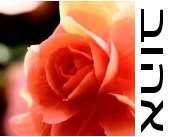
10.11.16 (Tishri 9, 5777) How do we change? How are we made new? Is it through self-effort? making resolutions? changing our diet or wardrobe? going into counselling? joining a "religion"? Or do we change by the miracle of God's compassionate intervention in our lives? When Yeshua invites us to turn and come to Him, he wants us to awaken to something so valuable that we would be willing to give up everything in the world to take hold of it (Matt. 13:45-46). True spiritual transformation is not just about leaving your sin behind you (as good as that is), but is rather about discovering the glory of true and infinite life. It's about being the beloved. May the Lord help us see...
God's love sees the hidden beauty, worth, and value of your life. "Again, the kingdom of heaven is like a merchant in search of fine pearls, who, on finding one pearl of great value, went and sold all that he had and bought it" (Matt. 13:45-46). You may be tempted to identify with the merchant and regard this parable as a challenge to give up everything to obtain the surpassing worth of the kingdom of heaven, but another way to understand it is to see God as the Merchant, the central character of the story.... Instead of you paying the great price for the pearl, turn the story around: God pays the price - and you are regarded as His choice pearl! You are a treasured possession, the "apple of God's eye..."
We are changed by the power of unconditional love, but this means that we must allow ourselves to be loved without attempting to earn it (Rom. 4). If we are willing to receive love only if we regard ourselves as worthy or deserving of it, then we will reinforce the illusion that love can be bought, explained, or owed to us based on our merit.
Have you discovered the glory and wonder of God's unconditional love, despite the many sins and the shame of your life? Do you know "in your gut" that his love means no longer having to defend or explain yourself? God's love enables you to quit hiding what you really are from Him; you can give up the pretense of being something you're not. When you turn to the Lord in the transparency of your brokenness, weakness, and neediness, you will find Him there, accepting you for who you really are...
That's the message of gospel, after all. The cross of Yeshua is the end of "self improvement" projects, and that includes the "end of the law" as the means of attempting to find our acceptance before God (Rom. 10:4). We come to know God's love and acceptance "apart from the law," that is, despite our repeated failures, pain, and loss of the false self. We are truly changed as we disclose more and more of what we really are to God, that is, when we come "out of the shadows" to be made visible and healed before His glorious Presence. Then we discover the "lightness" of being united to the risen Messiah and the "law of the Spirit of life in Yeshua (תּוֹרַת רוּחַ הַחַיִּים בְּיֵשׁוּעַ). May God work within us all such a miracle!
Essence of Yom Kippur...

[ The following concerns Yom Kippur, or the "Day of Atonement..." ]
10.11.16 (Tishri 9, 5777) The earthy Tabernacle (i.e., Mishkan) and its furnishings were "copies" of the heavenly Temple and the Throne of God Himself. Moses was commanded to make the Sanctuary according to the "pattern" revealed at Sinai (Exod. 25:9). As it is written in our Scriptures, "For Messiah has entered, not into holy places made with hands, which are representations (ἀντίτυπος) of the true things, but into heaven itself, now to appear in the presence of God on our behalf" (Heb. 9:24). The centermost point of the earthly Tabernacle was the Ark of the Covenant (אֲרוֹן־הַקּדֶשׁ), a "three-in-one" box that contained God's Holy Word (i.e., the tablets of the Torah). As such, the Ark served as a symbol of kisei ha-kavod (כִּסֵּא הַכָּבוֹד), the Throne of Glory. The Ark stood entirely apart as the only furnishing placed in the "three-in-one" space called the Holy of Holies (קדֶשׁ הַקֳּדָשִׁים). Upon the cover of the Ark (i.e., the kapporet) were fashioned two cherubim (i.e., angel-like figures) that faced one another (Exod. 25:17-18). According to the Talmud (Succah 5b), each cherub had the face of a child - one boy and one girl - and their wings spread heavenward as their eyes gazed upon the cover (Exod. 25:20). This was the sacred place where the blood of purification was sprinkled during Yom Kippur, the Day of Atonement, and this is the Place (הַמָּקוֹם) that prefigured the offering of the blood of the Messiah, our eternal Mediator of the New Covenant. "For I will appear in the cloud over the kapporet" (Lev. 16:2; Exod. 25:22). As it is written, "I have blotted out your transgressions like a thick cloud and your sins like heavy mist; return to me (שׁוּבָה אֵלַי), for I have redeemed you (Isa. 44:22).
The central ritual of atonement given in the Torah is that of the anointed High Priest sprinkling sacrificial blood over the tablets of the law upon the kapporet (the "mercy seat") of the Ark of the Covenant - the Place where "Love and truth meet, where righteousness and peace kiss" (Psalm 85:10). It was from the midst of the surrounding cloud in the Holy of Holies that the Voice of the LORD was heard, just as it was in the midst of the surrounding cloud of darkness upon the cross that Yeshua cried out in intercession for our sins...
חֶסֶד־וֶאֱמֶת נִפְגָּשׁוּ
צֶדֶק וְשָׁלוֹם נָשָׁקוּ
che·sed ve·e·met nif·ga·shu
tzedek ve·sha·lom na·sha·ku

"Love and truth have met,
justice and peace have kissed."
(Psalm 85:10)

Download Study Card
Note further that the High Priest was required to perform the Yom Kippur avodah (service) alone, while wearing humble attire, divested of his glory, and in complete solitude: "No one may be in the tent of meeting from the time he enters to make atonement in the Holy Place until he comes out" (Lev. 16:17). The Hebrew text literally says, "no adam (אָדָם) shall be in the tent," which suggests that something more than the natural man is needed for divine intercession. And just as Moses alone approached God in the thick clouds at Sinai to receive the revelation of the Altar as mediator of the older covenant (Exod. 24:15), so Yeshua, the Mediator of the New Covenant, went through his severest agony on the cross as the darkness covered the earth (Luke 23:44; Matt. 27:45).
Teshuvah and Remedy...

10.11.16 (Tishri 9, 5777) The teshuvah (repentance) called for by Yeshua is not that of the rabbis... The rabbis want you to be sorry for your sins, to confess "every sin in the book," and to find "atonement" in religious rituals, but this is not "good news," but rather "stale news." The teshuvah of Yeshua is the miracle of new life; Messiah sets you free from the power of sin and death itself. The repentance of Yeshua is to trust in God's remedy for your sin: "This is the work of God, to believe in the One whom God sent" (John 6:29). "He saw that there was no man, and wondered that there was no one to intercede; then His own arm brought him salvation, and his righteousness upheld him" (Isa. 59:16). We must turn away from the idea that God demands anything from us other than trust in his love. "Truly, I say to you, unless you turn and become like children, you will never enter the kingdom of heaven" (Matt. 18:3). Stop trying to measure up to his standards. You simply cannot give more than you have the love to give, so you must begin by getting your heart needs met by accepting God's unconditional love. It's not about what you do for God, after all, but about what he does for you. That's the message of the gospel. Trust that you are rightly related to God because of the salvation of Yeshua, not because of your own efforts at self-improvement. "I tell you the solemn truth, the one who hears my message and believes the One who sent me has eternal life (חַיֵּי עוֹלָם) and will not be condemned, but has passed over (i.e., μετά + βαίνω, lit., "crossed over" [עָבַר]) from death to life" (John 5:24).
Do you believe that God loves you right now - just as you are - and that you don't have to change or improve yourself to be loved by him? Do you believe that, whatever your present condition, God loves you with the very passion that put Yeshua on the cross? The LORD is present for you now, if you will believe, not some time later, after you've attempted to remedy yourself... If we come to God in utter poverty of spirit, confessing our need for deliverance from the misery of ourselves, why do we think that, after so coming, we should later relate to God on a different basis? You are delivered by trusting in God's grace, by accepting his love for your soul, and likewise are you sanctified. We never get beyond our need for the cross, which is to say that we always need God's compassion and mercy...
"And this is one of the most crucial definitions for the whole of Christianity; that the opposite of sin is not virtue but faith." - Soren Kierkegaard (1813-1855)
We must be careful not to worship an idol, that is, a false concept of God! It is possible to read the Bible, to go to church or synagogue, and yet worship a pagan god. How so? By not knowing the heart of the Father; by not honoring the One who passionately seeks our healing. We know the Father by the Son, that is, in "the language of Son" (Heb. 1:2; Luke 10:21-24). Our heavenly Father is eager to forgive and embrace all of his children. In Yeshua's famous parable of the "prodigal son," the father saw his child a "long way off" and ran to embrace and kiss him - no questions asked, no explanations needed about his past. When the son nevertheless began reciting his carefully prepared speech of repentance, the father barely listened, and in his overwhelming joy instructed his servants, 'Bring quickly the best robe, and put it on him, and put a ring on his hand, and shoes on his feet. And bring the fattened calf and kill it, and let us eat and celebrate. For this my son was dead, and is alive again; he was lost, and is found...' (Luke 15:20-25).
Peace and love to you, friend... May you turn to Yeshua this hour.
Yom Kippur and Jonah...
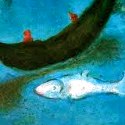
[ The following is related to Yom Kippur, the "Day of Atonement"... ]
10.10.16 (Tishri 8, 5777) During the afternoon service of Yom Kippur, the Book of Jonah is recited to awaken the heart to "Arise, call out to your God" (1:6). Like Jonah we first must be "swallowed up" in consciousness of our own rebellion before we realize we are undone, that we are without remedy apart from God's direct intervention and deliverance. We start there - in the "belly of the fish" - and later are resurrected to go forth by God's mercy and grace. Likewise we first see ourselves as undone and go to the cross, finding pardon and given the power of the ruach HaKodesh to live unto God according to the truth. But note that the imperatives of the New Testament are directed to the new nature given to us by God, and not to the old nature that has been crucified and done away. We are admonished to live in accordance with the truth of what God has done for us through the Moshia', the Savior. You are a new creation, therefore be who you are in the Messiah!
It is noteworthy that Yeshua mentioned the "sign of Jonah the prophet," that is, Jonah's miraculous deliverance after being entombed in the belly of the fish for three days, to authenticate his own claim to be Israel's Redeemer. "Just as Jonah was three days and three nights in the belly of the great fish, so will the Son of Man be three days and three nights in the belly of the earth" (Matt. 12:40). "This is an evil generation. It seeks a sign, and no sign will be given to it except the sign of Jonah the prophet (אוֹת יוֹנָה הַנָּבִיא). For as Jonah became a sign to the Ninevites, so also the Son of Man will be to this generation" (Luke 11:29-30). In other words, the story of Jonah foreshadowed the atoning sacrifice of the Messiah, that is, his death, burial and especially his miraculous resurrection on the third day. Just as God brought Jonah back to life after three days in the belly of the earth, so the resurrection of Yeshua from the dead would vindicate his claim to be the Savior and Redeemer of the world. In this way the "Sign of Jonah" and the sacrificial and atoning work of Yeshua as our High Priest of the new covenant are connected.
"We we were so utterly burdened beyond our strength that we despaired of life itself, yes, we felt that we had received the sentence of death; but that was to make us rely not on ourselves, but on God who raises the dead" (2 Cor 1:8-9). This marks the end of carnal hope, when we realize we are but "dead men walking," and from this extremity of inner desperation and clarity we learn to rely solely on God for what we need. Here we abandon ourselves to God's care, despite the despair, darkness, and fear. We rely on "God who raises the dead," because all other remedies have been vanquished. It is a great gift to be so afflicted, for these "troubles of love" teach us to trust God alone for all we need. The only way out is through. We don't seek an easy way of life, but only that the LORD our God be with us throughout our troubles...
Torah of Blood Atonement...

[ The following is related to Yom Kippur, the "Day of Atonement"... ]
10.10.16 (Tishri 8, 5777) "The Life is in the blood..." (Lev. 17:11). The "Day of Atonement" is the English translation for Yom Kippurim (יוֹם הַכִּפֻּרִים). The shoresh (root) for the word "kippur" is kafar (כָּפַר), which probably derives from the word kofer, meaning "ransom." This word is parallel to the word "redeem" (Psalm 49:7) and means "to exchange by offering a substitute." The great majority of usages in the Tanakh concern "making an atonement" by the priestly ritual of sprinkling of sacrificial blood to cleanse from sin or defilement (i.e., tahora). The blood of the sacrifice was given in exchange for the life of the worshiper (the "life-for-life" principle). This symbolism is clarified when the worshiper leaned his hands on the head of the sacrifice (semichah) while confessing sin (Lev. 16:21; 1:4; 4:4, etc.). The shoresh also appears in the term kapporet [the "Mercy Seat," but better rendered as simply the place of blood covering]. The kapporet was the golden cover of the sacred chest in the Holy of Holies of the Tabernacle (or Temple) where the sacrificial blood was presented to cleanse the people from their sins.
כִּי נֶפֶשׁ הַבָּשָׂר בַּדָּם הִוא
וַאֲנִי נְתַתִּיו לָכֶם עַל־הַמִּזְבֵּחַ
לְכַפֵּר עַל־נַפְשׁתֵיכֶם
כִּי־הַדָּם הוּא בַּנֶּפֶשׁ יְכַפֵּר
ki · ne·fesh · ha·ba·sar · ba·dam · hi
va·a·ni · ne·ta·tiv · la·khem · al · ha·miz·bei·ach
le·kha·peir · al · naf·sho·tei·khem
ki · ha·dam · hu · ba·ne·fesh · ye·kha·peir

"For the life of the flesh is in the blood,
and I have given it for you on the altar
to atone for your souls,
for it is the blood that makes atonement by the life."
(Lev. 17:11)

Hebrew Study Card
The blood of Messiah ransoms our souls from death, brings us near to the Divine Presence, and cleanses us from all sin (Lev. 17:11; Rom. 3:25; Heb. 9:22; Eph. 1:7; Col. 1:14; 1 John 2:2). The voice of his blood cries out on our behalf (Heb. 12:24), and his life was given in exchange for ours: "For our sake he made him to be sin who knew no sin, so that in him we might become the righteousness of God" (2 Cor. 5:12). We "lean into" Yeshua, confessing our sins, and are cleansed from all unrighteousness (1 John 1:9). In the New Testament Yeshua is called the "atonement" (ἱλασμός) for our sins (1 John 2:2), a Greek word that was used in the Septuagint (i.e., LXX) to translate the Hebrew word kippurim in the Torah (Lev. 25:9). The Septuagint uses the same word (ἱλασμός) to translate the Hebrew word for selichah (forgiveness), for example: "But with you there is forgiveness (הַסְּלִיחָה), that you may be held in awe" (Psalm 130:4). Just as the blood was sprinkled upon the kapporet (cover of the Ark of the Covenant) in the Holy of Holies during the Yom Kippur ritual, so the blood of Messiah was sprinkled the heavenly kapporet, the very altar of Almighty God, to secure for us everlasting redemption and healing...
"Come now and reason with the LORD. Though your sins are as scarlet, they shall be as white as snow" (Isa. 1:18). The blood of bulls and goats could never fully remove our sins since they did not represent the very life of God poured out on our behalf (Heb. 10:4). God chose the ultimate "cleansing agent" for sin by shedding the precious blood of His own Son for the sake of our atonement (1 Cor. 15:3-4; Rom. 5:11). The blood of Yeshua truly cleanses us from the stain of our sins (Heb. 10:12-14). We make "spiritual contact" with the sacrificial blood of Yeshua through faith -- by being "baptized into His death" and identifying with Him as our Sin-Bearer before God. We then are delivered from the law's verdict against us and accepted into the Kingdom of God (Rom. 4:25; 2 Cor. 5:21; Col. 1:13-14, 2:10-15).
לְכוּ־נָא וְנִוָּכְחָה יאמַר יְהוָה
אִם־יִהְיוּ חֲטָאֵיכֶם כַּשָּׁנִים כַּשֶּׁלֶג יַלְבִּינוּ
אִם־יַאְדִּימוּ כַתּוֹלָע כַּצֶּמֶר יִהְיוּ
lekhu · na · venivakhechah · yomar · Adonai
im · yihehu · chata'eikhem · kashanim · kasheleg · yalbinu
im · ya'adinu · khatolah · katzemer · yiheyu

"Come now, let us reason together, says the LORD:
though your sins are as scarlet, they shall be as white as snow;
though they are red like crimson, they shall become like wool."
(Isa. 1:18)
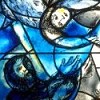
Hebrew Study Card
Behold the Goat of God...

[ Yom Kippur, or the "Day of Atonement," begins Tuesday, Oct. 11th at sundown this year. ]
10.10.16 (Tishri 8, 5777) The original Passover sacrifice (korban Pesach) was not given to the Levitical priesthood as a sin offering since it preceded Sinai and the giving of the laws concerning the sacrificial rites. In the same way, Yeshua's sacrifice was directed from Heaven itself by means of the prophetic office of Malki-Tzedek (מַלְכִּי־צֶדֶק) - a higher order of priesthood (Gen. 14:18; Psalm 110:4; Heb. 7).
While most people are perhaps more familiar with the Biblical imagery of Messiah as "the Lamb of God" (שֵׂה הָאֱלהִים) who takes away the sins of the world (John 1:29), it is nonetheless true that he is also depicted as "the Goat of God" (עֵז הַאֱלהִים) who purifies us from iniquity and offers his blood for our everlasting atonement... As the "Lamb of God" Yeshua pictures redemption from slavery to Satan and freedom from the wrath of God. By means of his shed blood and broken body, the plague of death passes over us and we are set free to serve God (this is the Passover/Exodus connection). As the "Goat of God," Yeshua pictures both personal cleansing (i.e., "atonement" for sin: the Greek word (ἱλαστήριον) is used in the LXX for the kapporet (i.e., mercy seat) in the Holy of Holies that was sprinkled with the blood of the sacrifice on Yom Kippur), as well as corporate cleansing for ethnic Israel at the end of the Great Tribulation period. At that time Yeshua will function as Israel's true High Priest whose sacrifice is applied for Israel's purification, and so "all Israel shall be saved" (this is the great Yom Kippur connection).
Note: For more on this see, "Yom Kippur and the Gospel" and "Behold, the Goat of God."
Parashat Ha'Azinu (האזינו)

[ Our Torah portion for this week (Ha'azinu) is always read during the High Holidays... ]
10.09.16 (Tishri 7, 5777) In last week's Torah reading for Shabbat Shuvah (i.e., parashat Vayeleich), the LORD told Moses that after his death the Israelites would "go after foreign gods" and break covenant with Him. Because of this, God instructed Moses to teach the people a prophetic song (שיר נבואי) called the "Ha'azinu" that foretold Israel's history (past, present, and the future redemption) and warned the people not to stray from the path that the LORD had clearly instructed them (Deut. 31:19-22). Structured in the style of an "oracle," parashat Ha'azinu (הַאֲזִינוּ) contains Moses' final words of prophecy given to the Israelites before he ascended Mount Nebo to die...
We read the Ha'azinu every year near the High Holidays, either just before or just after Yom Kippur. In the Sefer Torah (Torah Scroll), the prophetic song is written in a stylized two-column format with extra spaces. Each line of the shirah (song) is matched by a second, parallel unit (Talmud: Shabbat 103b).
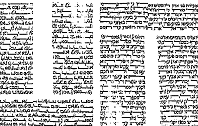 |
The Ha'azinu reminds us that who we listen to ultimately decides our fate. It begins, "Give ear, O heavens (הַאֲזִינוּ הַשָּׁמַיִם), and I will speak, and let the earth hear (וְתִשְׁמַע הָאָרֶץ) the words of my mouth" (Deut. 32:1). The word ha'azinu (הַאֲזִינוּ) comes from verb azan (אָזַנ), as does the Hebrew word for "ear" (i.e., ozen: אזֶן). The Midrash Rabbah says that the ear (אזֶן) gives life to all the organs of the body. How so? By listening (שׁמע, shema) to the Torah. This idea is repeated in the New Testament: "Faith comes from listening to the Word of God" (Rom. 10:17). The Word of God (דְּבַר־אֱלהִים) is our very life, friends...
The Shepherd's Call...
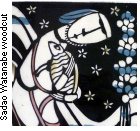
10.07.16 (Tishri 5, 5777) "What do you think? If a man has a hundred sheep, and one of them has gone astray, does he not leave the ninety-nine on the mountains and go in search of the one that went astray? And if he finds it, truly, I say to you, he rejoices over it more than over the ninety-nine that never went astray" (Matt. 18:12-13). Though it involves sorrow, and the pain of being lost, repentance is ultimately about finding joy, and when we return to God, we have reason to rejoice. The Good Shepherd says, "Rejoice with me, for I have found my sheep that was lost. Just so, I tell you, there will be more joy in heaven over one sinner who repents than over ninety-nine righteous persons who need no repentance" (Luke 15:6-7). The Son of Man came to seek and to save the lost: "For thus says the Lord GOD: Behold, I, I myself will search for my sheep and will seek them out... I myself will be the Shepherd of my sheep, and I myself will make them lie down, declares the Lord GOD. I will seek the lost, and I will bring back the banished, and I will bind up the injured, and I will strengthen the sick" (Ezek. 34:11,5-16).
אֲנִי אֶרְעֶה צאנִי וַאֲנִי אַרְבִּיצֵם נְאֻם אֲדנָי יְהוִה
אֶת־הָאבֶדֶת אֲבַקֵּשׁ וְאֶת־הַנִּדַּחַת אָשִׁיב
וְלַנִּשְׁבֶּרֶת אֶחֱבשׁ וְאֶת־הַחוֹלָה אֲחַזֵּק
ani · er·eh · tzo·ni · va·a·ni · ar·bi·tzem · ne·um · Adonai · E·lo·him
et · ha·o·ve·det · a·va·kesh · ve·et · ha·nid·da·chat · a·shiv
ve·la·nish·be·ret · e·che·vosh · ve·et · ha·cho·lah · a·cha·zek

"I myself will be the Shepherd of my sheep, and I myself will make them lie down,
declares the Lord GOD. I will seek the lost, and I will bring back the banished,
and I will bind up the injured, and I will strengthen the sick..."
(Ezek. 34:15-16)
Despite the struggles we sometimes (and often) face, let me wish you the peace of God that passes all understanding, that inner peace that comes when we surrender ourselves to the love of God given in Yeshua our LORD. Amen v'chazak. Shabbat shalom and shanah tovah!
Yom Kippur and Purim...
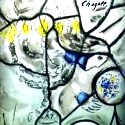
[ Yom Kippur, or the "Day of Atonement," begins Tuesday, Oct. 11th this year... ]
10.07.16 (Tishri 5, 5777) The great holiday of Yom Kippur (the Day of Atonement) is also known as Yom Kippurim in the Torah (יוֹם כִּפֻּרִים, see Lev. 23:28), which can be read as Yom Ke-Purim, a 'day like Purim' (i.e., יוֹם, "day" + כְּ, "like" + פֻּרִים, "purim"). Both Purim and Yom Kippur celebrate our deliverance from the great enemies of sin and death, and both holidays foreshadow the great purim (deliverance) we have in Yeshua our LORD. Note further that the Hebrew word for "year" (i.e., shanah: שׁנה) has the same letter value Yom ha'kippurim (i.e., יוֹם הַכִּפֻּרִים, see Lev. 23:27), which suggests that God's faithful deliverance and atoning love extends to us every day of the year.
The "ultimate" meaning of Yom Kippur, however, is to be forgiven and accepted by God on account of the salvation secured by Yeshua the Messiah at the cross... Our deliverance depends not only on the substitutionary death of Yeshua as our kapparah (atonement), but also on the substitutionary life He lived (and still lives) as our Mediator. As it is written in our Scriptures: "The LORD is alive and blessed is my Rock (חַי־יְהוָה וּבָרוּךְ צוּרִי); and ascended is the God of my salavtion (וְיָרוּם אֱלוֹהֵי יִשְׁעִי) (Psalm 18:46). Yeshua fulfills the Torah on our behalf (Rom. 10:4). The cure for our lawlessness is not more laws but a deeper sense of God's grace given to us in Yeshua, the Tzaddik who kept the law perfectly and ransomed us from its righteous judgment. Because of Yeshua we have grace and peace (shalom) with God.
Note: For more on this subject, see "The Purim - Yom Kippur Connection."
The Prophecy of Hope...

[ Words of blessing for the hope of our hearts.... Make them true in us, O LORD! Amen. ]
10.07.16 (Tishri 5, 5777) Shema Yisrael, Adonai Eloheinu, Adonai echad: "Listen, O Israel, the LORD is our God; the LORD is one." Instead of thinking of the Shema (שְׁמַע) as a commandment to be externally obeyed, you can trust it as a prophecy about your inner life: "You shall love (וְאָהַבְתָּ) the LORD your God with all your heart, and with all your soul, and with all your might" (Deut. 6:5). Only God can quicken a dead heart, after all, and fill the soul with holy affections. Only the LORD can impart to us strength needed to take hold of promises as He writes His Torah upon our heart. As it is written, "For from him and through him and to him are all things. To him be glory forever" (Rom. 11:36).
וְאָהַבְתָּ אֵת יְהוָה אֱלהֶיךָ בְּכָל־לְבָבְךָ
וּבְכָל־נַפְשְׁךָ וּבְכָל־מְאדֶךָ
ve·a·hav·ta · et · Adonai · E·lo·he·kha · be·khol · le·vav·kha
u·ve·khol · naf·she·kha · u·ve·khol · me·o·de·kha

"You shall love the LORD your God with all your heart
and with all your soul and with all your might"
(Deut. 6:5)

Hebrew Study Card
God will take away your stony heart and give you a new heart, along with a new spirit to be willing to know His love, as it is written, "I will give you a new heart, and a new spirit I will put within you. And I will remove the heart of stone from your flesh and give you a heart of flesh" (Ezek. 36:26). Your new heart will be like Yeshua's own: open, accessible, flexible, trusting, sharing, emotionally alive, able to feel, pulsating with God's energy and power...
Here these words of Scripture again: "you shall love (וְאָהַבְתָּ) the LORD your God with all your heart, and with all your soul, and with all your might" (Deut. 6:5). The promise is this: "you shall love," since love is what is most true about who you are... You shall love the LORD, since He is the Source and End of all real love. You will love the LORD more and more, as you grow ever closer to Him and one day will behold Him panim-el-panim, "face to face." You shall love the LORD with all your heart, which implies God has indeed given you a new heart to love Him with; and with all your soul, which implies that you are enabled to truly feel, and that your heart is made tender and sensitized; and with all your might - that is, with all your "muchness," your "substance," or that reality that makes you who you really are in the LORD... May the LORD fulfill this prophecy in you, friend.
Teshuvah of the Tongue...

10.07.16 (Tishri 5, 5777) Our words reveal what is hidden within our hearts, and therefore - because words and thoughts are intimately connected - we must be very careful about how we think, and especially about how we esteem others. The Chofetz Chaim wrote that the foundational principle of shemirat ha-lashon (guarding our speech) is to esteem others in the best possible light. This involves hakarat tovah, that is, recognizing the good in others, and choosing to see with ayin tovah, a "good eye." It is better to judge favorably - even if we are in error - than it is to judge critically -- even if we are telling the truth. "Let the words of my mouth, and the meditation of my heart, be acceptable in your sight, O LORD my Rock and my Redeemer (Psalm 19:14).
Since the use of language presupposes the laws of logic, every utterance we make is grounded in transcendental meaning and significance.... In the world to come you will be shocked to understand that everything you thought, everything you said, and everything you did was given to you from above, and therefore has tremendous significance.
יִהְיוּ לְרָצוֹן אִמְרֵי־פִי
וְהֶגְיוֹן לִבִּי לְפָנֶיךָ יְהוָה צוּרִי וְגאֲלִי
yi·he·yu · le·ra·tzon · im·rei · fi
ve'heg·yon · lib·bi · le·fa·ne·kha · Adonai · tzu·ri · ve'go'a·li

"Let the words of my mouth and the meditation of my heart be acceptable to You,
O LORD, my rock and my redeemer."

Hebrew Study Card
May it please God to help us use our words for the purpose of strengthening and upbuilding (οἰκοδομὴν) one another (Eph. 4:29). May our words always be gracious and "seasoned with salt" (Col. 4:6). Dear Lord, awaken our hearts. As it is written: "Finally, brothers, whatever is true, whatever is honorable, whatever is just, whatever is pure, whatever is lovely, whatever is commendable, if there is any excellence, if there is anything worthy of praise, think about these things... and the God of peace will be with you" (Phil. 4:7-8), and, "whoever keeps His word, in him truly the love of God is perfected" (1 John 2:5).
Note: For more on this vital topic see the articles: Teshuvah of the Mind, and The Importance of Truth: Teshuvah and Moral Courage.
Come just as you are...

10.07.16 (Tishri 5, 5777) Some people seem to think that we first must repent and then we will encounter the Lord, but it's actually the other way around: we first encounter the Savior and then we learn the meaning of repentance. Thus Paul's eyes were opened after he was first blinded by the light (Acts 9:3-6). Likewise, it is only after we have met the Lord that we begin to understand our blindness of heart, but as learn to see more clearly, we encounter more and more of his love (Rom. 5:20). As Yeshua said, "My yoke is pleasant (χρηστὸς) and my burden is light (Matt. 11:30). Repentance, then, is a progressive and ongoing process of awakening, as we learn to love God and to accept ourselves, despite our struggle with sin. As Anselm prayed: "O Lord, grant us grace to desire thee with all our hearts, that so desiring, we may seek and find thee, and so finding thee, may love thee, and loving thee may hate those things from which you have redeemed us."
We encounter the Lord "just as we are," by means of his gracious intervention in our lives, and so we continue to live by faith in God's grace (indeed, what we call "sanctification" is often just "catching up" with the miracle of his revelation to us). And we always come to God "just as we are," since we are never more than what we are in the truth: "by the grace of God I am what I am," as Paul said. "For all things come from You, and from your hand we give back to you" (1 Chron. 29:14). Therefore the Spirit says, "Come just as you are, or you may never come at all...."
A prayer to the One calling you to come: "I come to you just as I am - needy, sick within, weary, and broken... I come seeking your love; I come because you invited me to come: I open my heart, such as it is, to you; please join me here, in this place of my need, in this place of pain, and wrap me your comfort. I can only love you as I know your love, Lord Yeshua, so please help me to know your love in the truth. Amen."
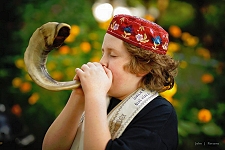 |
Happy Birthday, Josiah!
Teshuvah's Confession...
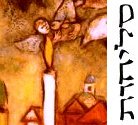
10.06.16 (Tishri 4, 5777) Teshuvah and confession go hand in hand. Confession means bringing yourself naked before the Divine Light to agree with the truth about who you are. Indeed, the Greek word "homologia" (ὁμολογία) literally means "saying the same thing" - from ὁμός (same) and λόγος (word). As I've said before, in Modern Hebrew teshuvah (תְּשׁוּבָה) means an "answer" to a shelah (שְׁאֵלָה), or a question. God's love for us is the question, and our teshuvah – our turning of the heart toward Him – is the answer (and healing) for our broken hearts. Teshuvah is one of the great gifts God gives each of us – the ability to turn back to Him and seek healing for our brokenness.
May we turn to Him now!
Seek God and Live...

[ The following concerns the "Season of Repentance" leading up to the High Holidays... ]
10.06.16 (Tishri 4, 5777) The sages affirm, "This world is like a corridor before the World to Come; prepare yourself in the corridor, that you may enter into the hall" (Avot 4:21), which implies that the great commandment is always "seek Me and live" (Amos 5:4). "Seek the LORD while he may be found; call upon him while he is near" (Isa. 55:6). "Where can God be found?" asks the Kotzker rebbe, "but where one lets Him in..." God sometimes "hides" from us so that we are given the opportunity to seek Him with all our hearts.
כִּי כה אָמַר יְהוָה לְבֵית יִשְׂרָאֵל
דִּרְשׁוּנִי וִחְיוּ
ki · kho · a·mar · Adonai · le·veit · Yis·ra·el:
dir·shu·ni · vi·che·yu

For thus says the LORD to the house of Israel:
"Seek me and live!"
(Amos 5:4)

Download Study Card
God's Spirit is always calling for us to return to Him, to "seek God and live..." What is holding your heart back? In Hebrew teshuvah (תְּשׁוּבָה) means an "answer" to a to a shelah (שְׁאֵלָה), or a question. It is a response to the call of God... The One who ransomed us from death and offers us life in abundance is standing at the door knocking, waiting for us to respond to call (Rev. 3:20). During this season of teshuvah, may we all hear the Voice of Him who invites the brokenhearted to join him: "Come to me, all who labor and are heavy laden, and I will give you rest" (Matt. 11:28). ברוך אתה יהוה המנחם -- "Blessed are you LORD the Comforter...."
Atonement and God's Love...
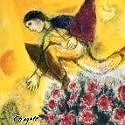
[ The following is related to the solemn holiday of Yom Kippur, or the "Day of Atonement," which begins Tuesday, Oct. 11th this year... ]
10.06.16 (Tishri 4, 5777) Many of our deepest anxieties come from the fear of death, whether we are conscious of this or not... Death represents fear of the unknown, fear of being abandoned, fear of being rejected, fear of being separated from others, and so on. I am so glad Yeshua gives us eternal life, which for me is not so much about immortality of the soul as it is being loved and accepted by God... That is what "at-one-ment" means, after all. Because God loves and accepts us, we trust Him to be present for us, even in the darkest of hours, on the other side of the veil, where he has prepared a place for us (John 14:2). As Yeshua said, "I tell you the solemn truth, the one who hears my message and believes the One who sent me has eternal life (חַיֵּי עוֹלָם) and will not be condemned, but has passed (i.e., μετά + βαίνω, lit., "crossed over" [עָבַר]) from death to life" (John 5:24). God's love "crosses over" from death to life and now forever sustains me.
Ultimately, Yom Kippur is about God's love and acceptance, that is, His way of making purification for our sins. As I've explained before, the word for love (i.e., ahavah: אהבה) equals the number thirteen (1+5+2+5=13), but when shared it is multiplied: 13 x 2 = 26, which is the same value for the Sacred Name (יהוה), i.e., (10+5+6+5=26). Likewise the Hebrew word for "life" is chayim (חַיִּים), is written in the plural to emphasize that life cannot be lived alone but must be shared. Notice that within the word itself are embedded two consecutive Yods (יי), representing unity in plurality (Yod-Yod is an abbreviation for YHVH, also indicating the "deep Akedah" of Father and Son). God gave up His life so that we can be in relationship with Him, that is, so that we can be "at-one" with His heart for us. Whatever else it may mean, then, the word "atonement" (i.e., kapparah, "covering," "protection," "purification," "forgiveness") is about accepting God's heart for you - being unified in his love - and if you miss that, you've missed the entire point of the high holiday season. Yom Kippur, then, is a time to celebrate God's great love for us.
Yom Kippur Mercies...

10.06.16 (Tishri 4, 5777) Rosh Hashanah is called Yom Ha-Din (יוֹם הַדִּין), the Day of Judgment, whereas Yom Kippur is called Yom Ha-Rachamim (יוֹם הָרַחֲמִים), or the Day of Mercies, which suggests that God is first revealed as our Creator and Judge before He is known as our merciful Savior. This is hinted in the two accounts of creation, where God is first revealed as Elohim (Gen. 1:1), but later is revealed as YHVH (יהוה) when He breathed life into man nishmat chayim, the breath of life (Gen. 2:4). It is somewhat odd, however, that during Rosh Hashanah we do not approach God as our Judge, beating our breast in sorrow during confession of sin, as we do on Yom Kippur. Some say the reason we celebrate, eating special foods, rejoicing, listening to the shofar, is because we rejoice in the kingship of God as His royal children, and only later do we appeal to Him as merciful Judge in light of His revelation as YHVH, our Savior, Redeemer, and Lord. As believers in Yeshua, we have all the more reason to rejoice on Rosh Hashanah, since at the cross Yeshua took upon Himself our judgment to give us everlasting mercy from God. !הַלְלוּ־יָהּ
Yom Kippur - Day of Atonement
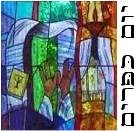
[ This year the Yom Kippur fast begins an hour before sundown on Tuesday, October 11th and lasts until an hour past sundown on Wednesday, October 12th.... ]
10.06.16 (Tishri 4, 5777) Yom Kippur (יוֹם הַכִּפּוּרִים), or the "Day of Atonement(s)," is regarded as the holiest day of the Jewish year, and provides prophetic insight regarding the Second Coming of the Messiah, the restoration of national Israel, and the final judgment of the world. It is also a day that reveals the High-Priestly work of Yeshua as our Kohen Gadol (High Priest) after the order of Malki-Tzedek (Heb. 5:10, 6:20). The term Yom Kippur is written in the plural in the Torah, Yom Ha-Kippurim (יוֹם הַכִּפֻּרִים), which alludes to the two great atonements given by the LORD - the first for those among all the nations who turn to Yeshua for cleansing and forgiveness, and the second for the purification of ethnic Israel during Yom Adonai, the great Day of the LORD (יוֹם־יְהוָה הַגָּדוֹל) at the End of Days.
For more information, see the Yom Kippur pages.
Teshuvah and Sanity...

10.05.16 (Tishri 3, 5777) It is written in our Scriptures (2 Tim. 1:7) that "God has not given us the spirit of fear (πνεῦμα δειλίας), but of power, and love, and a sound mind" (note that the term "sound mind" comes from the word saos (σάος) "safe," or under the protective restraining influence of the Spirit of God). Understand the connection between fear and confusion, then, and note further the connection between having a sound mind and a heart of peace and courage (Isa. 32:17)... A fearful or shameful attitude, then, enervates your resolve, quells your love, and introduces pain to your thinking. It is the old ruse of the enemy of our souls to lead us to despair, the exile of shame, and cruel bondage to untruth. As always the answer is the same: namely, teshuvah, turning to God and embracing the grace and love given in Yeshua as our deepest reality, our power, our heart, and our mind.
אֵלֶיךָ יְהוָה נַפְשִׁי אֶשָּׂא
אֱלהַי בְּךָ בָטַחְתִּי אַל־אֵבוֹשָׁה
אַל־יַעַלְצוּ איְבַי לִי
elekha Adonai nafshi essa
Elohai bekha vatachti al-evoshah
al-ya'aletzu oyvai li

"Unto thee, O LORD, do I lift up my soul.
O my God, I trust in thee: let me not be ashamed,
let not mine enemies triumph over me."
(Psalm 25:1-2)
The Sanctuary of Teshuvah...

10.05.16 (Tishri 3, 5777) The message of teshuvah (repentance) is one of healing. As is written in our Torah, "Guard well your souls..." (וְנִשְׁמַרְתֶּם מְאד לְנַפְשׁתֵיכֶם) [Deut. 4:15]. The Hebrew grammar of this verse is a bit unusual, since the verb shamar (שָׁמַר), meaning to "guard" or to "keep," is written in the passive voice (niphal), i.e., "Let yourselves be guarded well..." If we open our hearts to heed or listen to the truth of God - if we let go and surrender to God's will for our lives - we will be protected from the snares of idolatry. "Know therefore today, and lay it to your heart (וַהֲשֵׁבתָ אֶל־לְבָבֶךָ), that the LORD is God in heaven above and on the earth beneath -- there is no other" (Deut. 4:39). When you surrender from the heart you will understand that "the LORD is your Guard" (יְהוָה שׁמְרֶךָ); the LORD is yishmor et nafshekha - "the One who guards your life" (Psalm 121:5,7).
Redeeming the Time...
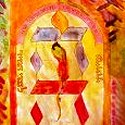
10.05.16 (Tishri 3, 5777) The "appointed times" (i.e., mo'edim: מוֹעֲדִים) were given by God to help us turn away from the omnipresent urge within the human heart to embrace vanity: "Every one of you shall revere his mother and his father and guard (שָׁמַר) my Sabbaths (שַׁבְּתתַי)... Do not turn to worthlessness (i.e., אֱלִיל) or make for yourselves any molten gods" (Lev. 19:3-4). In other words, the Biblical holidays - including Shabbat, Passover, and so on - were intended to help us to sanctify ("set apart," "make holy") the times and seasons in order to remind us of God's Presence (Psalm 104:19). Therefore they are called mikra'ei kodesh (מִקְרָאֵי קדֶשׁ), "times in which holiness is proclaimed" (Lev. 23:2). The Torah's declaration that these days are holy implies that they are set apart for special activities, such as commemorating God as our Creator (Shabbat), our Redeemer (Passover), our Resurrection (Firstfruits), our Lawgiver (Shavuot), our King (Rosh Hashanah), our High Priest (Yom Kippur), our Shelter (Sukkot), and so on. In this connection it should be noted that it is a mistake to assume that the divine calendar was somehow abrogated with the cross of Yeshua, since all of the Jewish holidays center on Him, and indeed the advent of the Ruach Ha-Kodesh (Holy Spirit) occurred precisely after the prescribed 49 day countdown to Shavuot (Acts 1:8; 2:1-4).
Presently our lives "suspended" between two worlds - this world with its illusions (olam hazeh), and the real world of spiritual substance and meaning (olam haba). We exist in an "already-not-yet" state of expectation and yearning where we must consciously mediate the truth of heaven by bringing it "down to earth." This is a truth war, and by truth I do not mean intellectual knowledge as much as the living truth that marks the lifestyle and vision of a follower of Messiah. We consciously remember Torah truth; we choose to always "set the LORD before us," and take "every thought captive to the passion of Messiah..." May God help each of us heed the call to walk in holiness by the power of His love and grace. Amen.
The Goal of Holiness...

[ The following is related to Yom Kippur and the Days of Awe... ]
10.04.16 (Tishri 2, 5777) "Be holy as I am holy" (Lev. 19:2). This doesn't mean wrapping yourself up in some protective cloak of religious rituals as much as it means accepting your own atonement: reconciling who you are with your past, finding healing and love, and walking in genuine hope... Holiness isn't as much "separation" from the profane as it is "consecration" to the sacred, and in that sense it is a kind of teshuvah, a turning of the heart back to reality.... Negatively put, "being holy" is turning away from fear, despair, and anger; positively put, it is embracing the worth and value of life, respecting the Divine Presence, and walking in the radiance of God's love. Hashivenu Adonai....
Teshuvah of Brokenness...
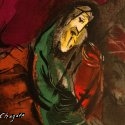
10.04.16 (Tishri 2, 5777) Regarding the call to repentance we read: "Rend your hearts and not your garments and return to the LORD your God (וְשׁוּבוּ אֶל־יְהוָה אֱלהֵיכֶם), for he is gracious and merciful, slow to anger, and abounding in love..." (Joel 2:13). Genuine teshuvah (repentance) is not about the "outer layers" of life, but engages the deepest depths of heart; it is not expressed in religious practices or rituals but in personal brokenness and utter desperation... As King David said, "the sacrifices of God are a broken spirit (רוּחַ נִשְׁבָּרָה); a broken and contrite heart (לֵב־נִשְׁבָּר וְנִדְכֶּה), O God, you will not despise" (Psalm 51:17). As is written in our Haftarah portion for Shabbat Shuvah: "Return O Israel (שׁוּבָה יִשְׂרָאֵל), to the LORD your God, for you have stumbled because of your iniquity; take with you words and return to the LORD (וְשׁוּבוּ אֶל־יְהוָה) and say to him, 'Take away all iniquity; accept what is good, and we will pay with bulls the vows of our lips'" (Hos. 14:1-2).
Note that the appeal to the LORD as "gracious and merciful, slow to anger, and abounding in steadfast love" (חַנּוּן וְרַחוּם הוּא אֶרֶךְ אַפַּיִם וְרַב־חֶסֶד) recalls the meaning of YHVH (יהוה) revealed to Moses in his state of brokenness over the sin of the Golden Calf (Exod. 34:6-7).
Shanah Tovah, friends!

10.03.16 (Tishri 1, 5777) Happy New Year - Shanah Tovah - friends! May this coming year be good and sweet for you. Here are a few pictures taken during our celebration for Rosh Hashanah 5777. As you can see, our kids are getting bigger: Josiah is now 11 and Judah is 7, though Emanuel David is only 8 months old now, so this is his very first Rosh Hashanah! Thank you for so much praying for our children...
Left-to-right (top): 1. Olga with Josiah, Judah, and Emanuel; 2. round challah; 3. John blows shofar;
4. Emanuel David dressed for the holiday; 5. apples and honey.
(bottom): 1. Holiday items; 2. lighting the Yom Tov candles; 3. Vadim; 4) Our simanim plate
בַּחֲצצְרוֹת וְקוֹל שׁוֹפָר
הָרִיעוּ לִפְנֵי הַמֶּלֶךְ יְהוָה
ba·cha·tzotz·rot · ve·kol · sho·far
ha·ri·u · lif·nei · ha·me·lekh · Adonai

"With trumpets and the sound of the shofar
shout for joy before the King, the LORD!"
(Psalm 98:6)

Listen to the Shofar:

We sincerely wish you "shanah tovah u'metukah ba'Adoneinu Yeshua ha-Mashiach" - a good and sweet year in our Lord Jesus the Messiah! May the LORD God heal you, body and soul; may He ease your pain, increase your strength, and release you from all your fears... May blessing, love, joy, and true shalom surround you and fill you with ongoing wonder and thanks. In the Name above all Names we pray: Amen.
The Days of Awe...

10.03.16 (Tishri 1, 5777) According to Jewish tradition, on Rosh Hashanah (i.e., Tishri 1) the destiny of the righteous, the tzaddikim, are written in the Book of Life (סֵפֶר הַחַיִּים), and the destiny of the wicked, the resha'im, are written in the Book of Death (סֶפֶר הַמָּוֵת). However, most people will not be inscribed in either book, but have ten days -- from Rosh Hashanah until Yom Kippur -- to repent before "sealing their fate." On Yom Kippur, then, everyone's name will be written in one of the books. The ten days between Rosh Hashanah and Yom Kippur are therefore called Aseret Yemei Teshuvah (עֲשֶׂרֶת יְמֵי תְּשׁוּבָה) - the "Ten Days of Repentance" - because personal repentance can affect the divine decree for good.
 |
Followers of Yeshua are not legalists, of course, nor do we agree with the rabbis who claim that Rosh Hashanah is a day of our judgment, since that has judicially been taken care of at the cross of Messiah -- "Judgment Day" happened when Messiah was crucified for our sins. "He declared us not guilty because of his gracious love; and now we know that we are heirs of eternal life" (Titus 3:7). Our faith in Yeshua forever seals us in the Lamb's Book of Life (סֵפֶר הַחַיִּים)! Nevertheless we must turn to Him every day, we must walk in the light of his heart, and therefore the call to teshuvah (repentance) is always timely. Moreover there is a prophetic aspect to this season, as Yom Teruah (i.e., Rosh Hashanah) represents the "Day of the LORD" (יוֹם יְהוָה) and the imminent apocalyptic judgment of the present world... Just as the spring festivals foretold Messiah's first advent, so the fall festivals foretell his second coming... Moreover, "teruah" (תְּרוּעָה) is the blast of a shofar, the "calling up" signal for those who belong to Messiah; the "opening of the gate" to the Wedding of the Lamb! May God help us be ready to soon see our King!
Note: for more on this important subject, including the trust that we are forever "sealed for good" in the Lamb of God's Book of Life, see "Getting Ready for the Days of Awe."
Shabbat Shuvah - שַׁבַּת שׁוּבָה

10.03.16 (Tishri 1, 5777) The Sabbath between Rosh Hashanah and the solemn fast of Yom Kippur is the very first of the new year, called Shabbat Shuvah (שַׁבַּת שׁוּבָה) - that is, "the Sabbath of Return." It is called "shuvah" because the Haftarah (i.e., Hosea 14:1) begins, Shuvah Yisrael ad Adonai Elohekha (שׁוּבָה יִשְׂרָאֵל עַד יְהוָה אֱלהֶיךָ): "Return, O Israel, unto the LORD your God!" As the very first Shabbat of the new year, Shabbat Shuvah is intended to "set the tone" for the "Days of Awe" leading up to the great Day of Atonement.
שׁוּבָה יִשְׂרָאֵל עַד יְהוָה אֱלהֶיךָ
כִּי כָשַׁלְתָּ בַּעֲוֹנֶךָ
shu·vah · Yis·ra·el · ad · Adonai · E·lo·hey·kha,
ki · kha·shal·ta · ba·a·vo·ne·kha

"Return, O Israel, to the LORD your God,
for you have stumbled because of your iniquity."
(Hosea 14:1)

Download Study Card
Note the Hebrew grammar in this verse: "Return (שׁוּבָה), O Israel, until (עַד) the LORD is your God" (Hos. 14:1). We are called to repent until the LORD becomes "your God," that is, until you completely surrender yourself to His presence and love. You return as you "set the Lord always before you" and know him in all your ways (Psalm 16:8; Prov. 3:6).
Shanah Tovah, and may you be inscribed in the Lamb's book of life (סֵפֶר הַחַיִּים אֲשֶׁר לַשֶּׂה) for good, friends! Shalom in Yeshua our Lord.
Rosh Hashanah and the Lamb...
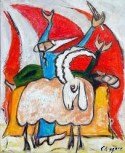
10.03.16 (Tishri 1, 5777) In the Torah we find that the word "love" (i.e., ahavah) first appears regarding Abraham's passion for his son: "Take your son, your only son Isaac, whom you love (אֲשֶׁר־אָהַבְתָּ), and go to the land of Moriah, and offer him there as a burnt offering on one of the mountains of which I shall tell you" (Gen. 22:2). After journeying to the place, Abraham told his child that God would provide a lamb (אֱלהִים יִרְאֶה־לּוֹ הַשֶּׂה), and then bound Isaac, laid him upon an altar, and raised his knife to slay him (Gen. 22:8-10). At the very last moment, the Angel of the Lord called out: "Abraham! Abraham! Do not lay your hand on the lad or do anything to him, for now I know that you fear God, seeing you have not withheld your son, your only son (בֵּן יָחִיד), from me" (Gen. 22:11-12). Abraham then "lifted up his eyes" and saw a ram "caught in a thicket" which he offered in place of his son. Abraham then named the place Adonai-Yireh (יהוה יִרְאֶה), "the LORD who provides" (Gen. 22:14). The sacrifice of the lamb for Isaac portrayed the coming sacrifice of Yeshua, the great "Lamb of God" (שֵׂה הָאֱלהִים) who would be offered in exchange for the trusting sinner (John 1:29). Indeed the story of how God provided the lamb at Moriah (and later during the Passover in Egypt) foreshadowed the greater redemption given in Messiah at the "Passover cross," and may be understood as the "Gospel according to Moses" (Luke 24:27; John 5:46). Therefore, during Rosh Hashanah, the Day of Judgment (יוֹם הַדִּין), we listen to the sound of the shofar (ram's horn) to remind us of the provision of Lamb of God given in place of Isaac...
|


